|
Friday, October 30, 2015
A Word From the Weiss 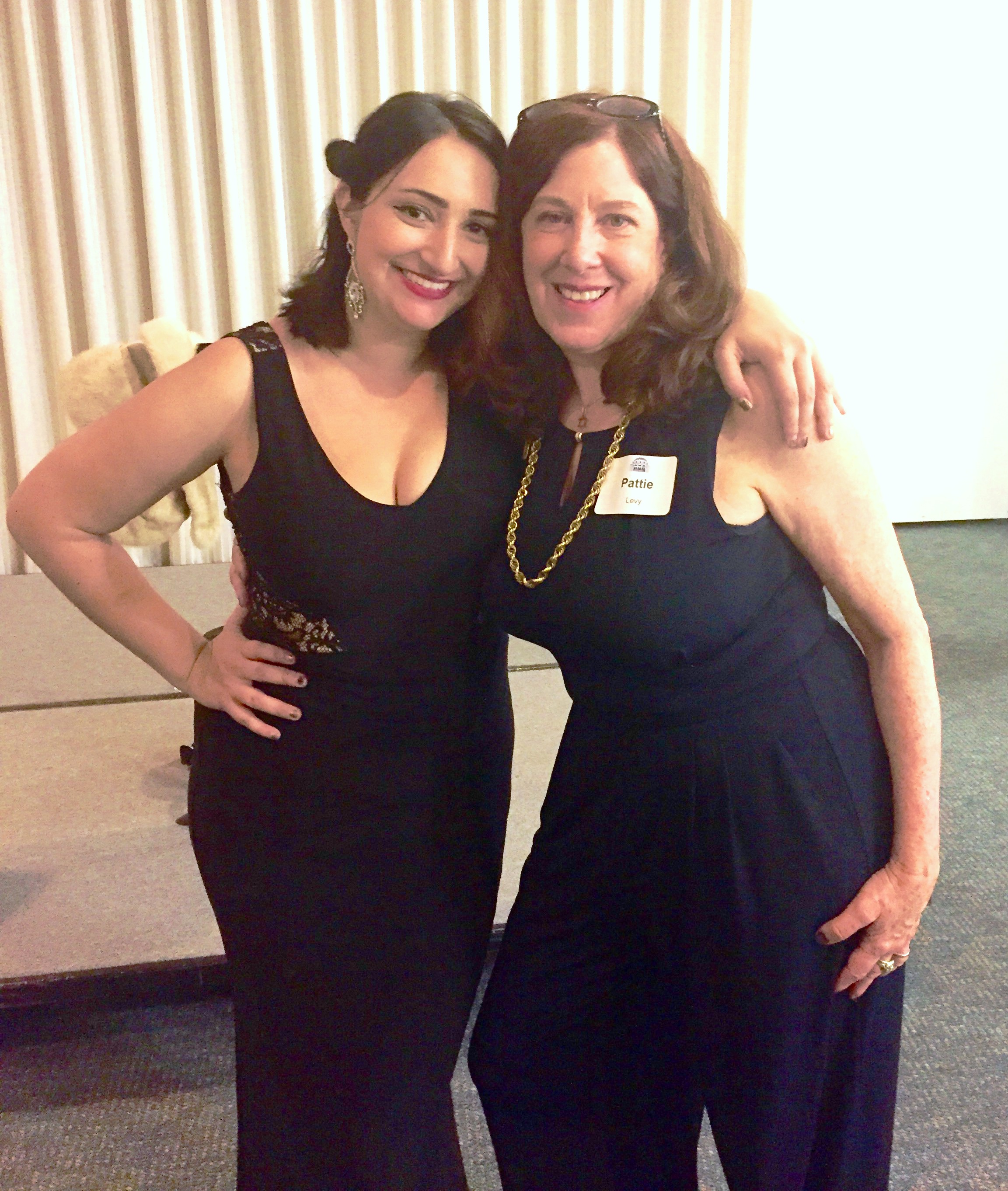 It had been months since I’d first been approached at my shul about whether
my daughter would be willing to sing at their annual fundraiser – months in which
negotiations about the performance, ticket prices,
catering, and whatnot had unfolded more like preparations for a war – so by the time I
arrived for the event last Saturday night, I was pretty much prepared for everything. Everything but the question a woman I barely
knew posed as I walked through the door.
“Exactly how big is your chest?” 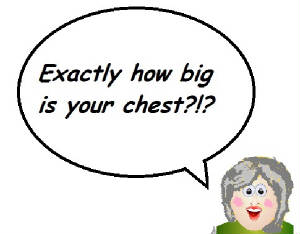 Say, what? “Excuse me?” was all I could muster. I’d been careful to vet the new outfit I was wearing with my husband
that very morning. Of course, I knew better than to dare tempt fate by posing the age-old
question, “Does this make me look fat?” At this point in my 30-plus-year marriage, I’ve
narrowed the wardrobe inquiry down to two basic but very crucial
questions: “Does this look OK?”and “Too
booby?” I’d been a
bit crestfallen (but not chest-fallen) when he’d responded by damning me with fairly faint praise, pronouncing my new Ivanka Trump navy jumpsuit
“fine.”  Then again, this gala, however glam it might be, was being held inside our synagogue. I wasn’t actually aiming for “Va-va-voom!” Although slightly form-fitting at the bust, the outfit I’d chosen was understated,
comfortable, and conveniently equipped with deep pockets in which to carry my iPhone and lipstick.
It was fine with me if I only looked “fine.” But now I could only wonder if my husband had been wrong on the second count. Had this woman taken
one gander at me and been so stunned that she actually wanted to know my bra size?
Apparently, for when I failed to respond, she proceeded to repeat her query again.
“Seriously, how big is your chest?” 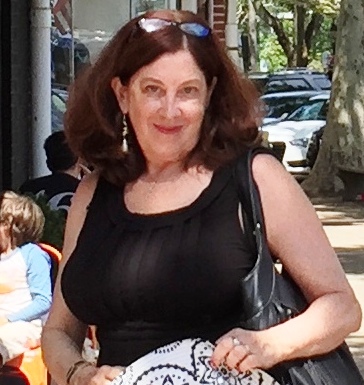 If only she knew what it felt like to be a little too well-endowed for your own good. I like to joke sometimes that my chest is apt to arrive places five minutes before the rest of me.
But the truth is I’m well aware of my physique. Painfully aware. It makes me feel self-conscious. Yet when I did little more than smile back in awkward silence now, the woman rephrased it once more. “Is
your chest swelling with pride?” she asked. “Is it just getting bigger and bigger?” “Oh!” I responded with a sigh, understanding
at last. “G-d forbid!” Of course I am proud whenever my daughter performs. I’m
proud of both my kids. And yes, I was particularly proud that she had been chosen for an honor like this one. But the truth is that when Allegra has an important gig – and this, to me, was very important – the main thing that swells inside
me is my underlying sense of anxiety. 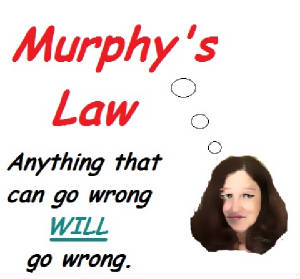 I’m not sure if it was my own chaotic upbringing
that inculcated this ever-present sense of foreboding,
or a cultural background that leaves me anxiously awaiting for the next pogrom. But I’m one of those people who not only
subscribes to Murphy’s Law – “anything that can go wrong will go
wrong” – but also believes
that this is doubly true if you’re a Jew. I’m not sure
exactly what I feared was going to go
wrong in this case, but that’s the magic of Murphy’s Law (or lack thereof). You can never tell what will fall through. You only know that, as Roseanne Roseannadanna would
say, “It’s always something.”  Over the many months since the synagogue had booked Allegra for this big event, I’d
worried that something unforeseen would happen to prevent her from honoring her
commitment. Yes, I know what you’re
thinking, but, believe me, this was not just an imaginary fear.
At the time that they had hired her, she had been performing in Hong Kong for a year at the Four Seasons hotel,
and she was still living there. When
she mentioned that she was being considered for a months-long engagement at an equally posh hotel in Bangkok, instead of being thrilled
for her, all I could think was, “What about the temple?” 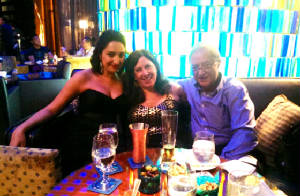 Every time she’d had a mysterious ache or pain over
the weeks preceding the gala, I’d worried that it might turn out to be something serious enough to prevent her from
doing the show. When she
had decided to drive home from NYC the day of the concert instead of the night before, I had
worried that something might happen on the road (traffic or worse) to prevent her
from arriving on time. Then I had mildly
panicked when she phoned that morning to report that her piano player for the show, Carmen, who had flown all the way from the Thelonious
Monk Institute just for the occasion, had accidentally locked herself out of her apartment with her phone, purse, and everything
else that she needed to take with her still inside.
What if Allegra had no piano accompaniment? Could Mr. Murphy (or Mr. Monk) have anticipated that? 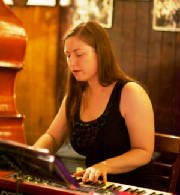 And when Allegra managed to arrive from NYC with Carmen and her belongings safely but showed up an hour late, I had continued to stress while she slowly got dressed, trying on a long black dress, then a short black dress,
then the long one all over again. I
know. I know. There’s all sorts of medication available to help with all
of this worrying. But I don’t think you can blame me. I felt pretty deeply invested in this particular gig. Over the past few
months, because Allegra had been living in Hong Kong, then NYC, I had acted as her hometown proxy, attending a meeting and fielding a steady stream
of emails. Being not just her mom and so-called “mom-ager,” but also a longtime
journalist, I’d written the press release for the show and then sent it out to assorted
newspapers and other media outlets. Although
Allegra had designed the poster advertising the event, I had gotten the copies made for her at Staples and then driven all
around town putting them up myself.  Then, when the
temple had requested biographical information for the program, I had volunteered
to compose a short bio not just for Allegra but for each of the other three members
of her band, stating their various rather stellar credentials.
And beyond that, let's face it. This wasn’t just any gig. This was my own daughter. Singing at my own shul. If something went wrong, how would I ever show my face
there again on Shabbat or Purim, let alone Yom Kippur? But somehow, everything now seemed to
be going pretty much according to plan. Was there
a chance that this much-anticipated event would go off without a hitch? 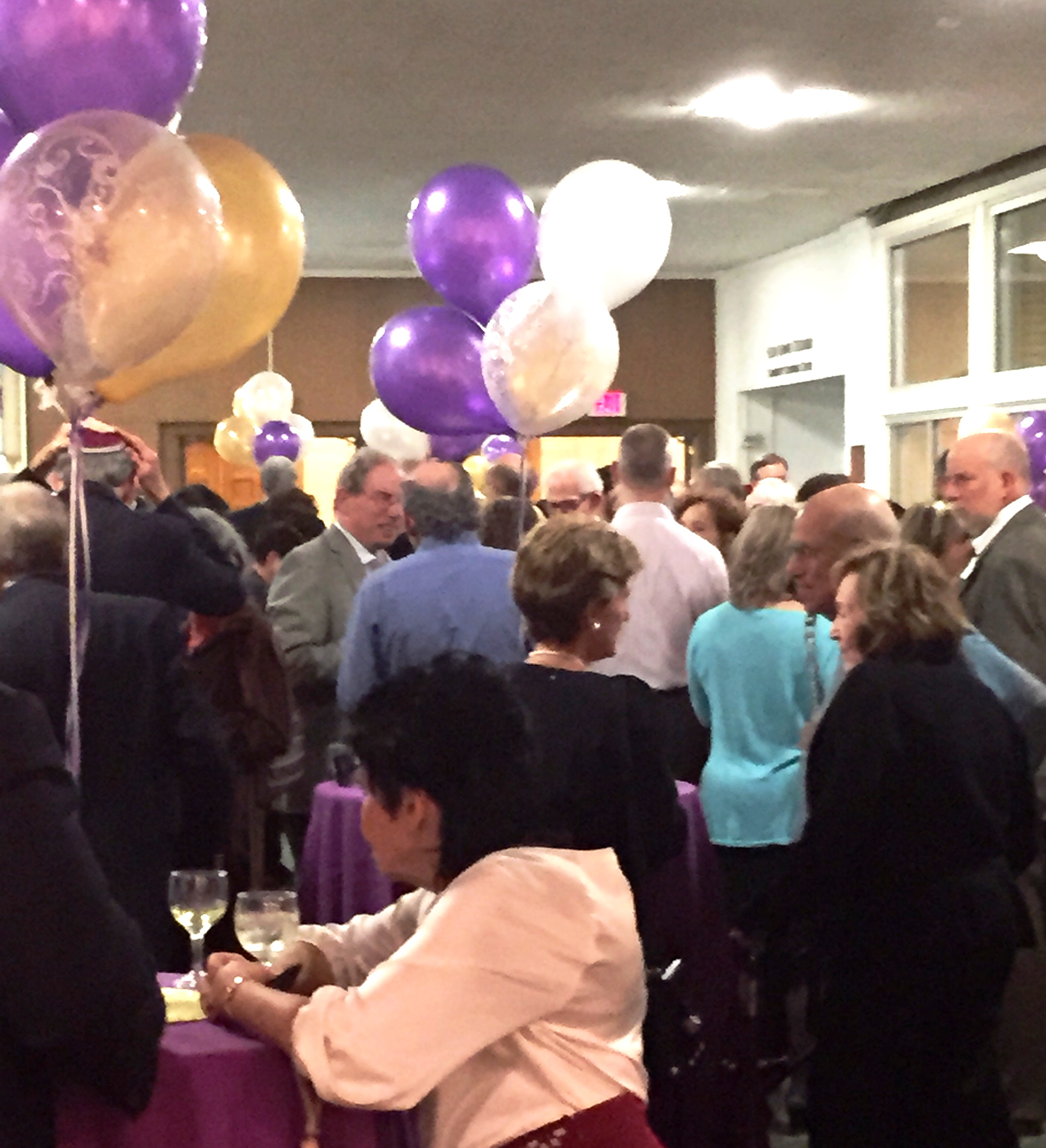 The temple certainly had gone all out with the arrangements.
The caterers were busy setting up the food and bar in the spacious lobby, which was decorated festively with colorful tablecloths
and big bouquets of balloons. And although I had arrived early with the band, guests soon began filing in to attend a havdalah religious service before the party. The party would consist of a 90-minute cocktail “hour,” during which wine and substantial hors d’oeuvres would be served at both stations and on butlered trays. 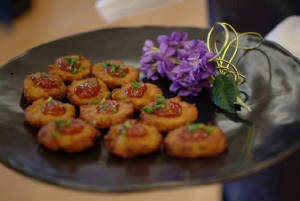 Although I was attending
as a guest, I felt obliged as Allegra’s
“mom-ager” to make sure that everyone in the band was well cared for and happy. So I spent most of the party time
traveling between the social hall in which the musicians were sequestered and the lobby filled with guests, fetching the group
anything they desired – a bottle of water, a glass of wine, or a little more on which to nosh.
The most challenging part of this was that, as the mother of the entertainer, every time I ventured out into
the crowd I was stopped by several people wishing to congratulate me. One actually requested my autograph on a cocktail napkin
(although no one else ever inquired about the proportions of my chest). But
finally, at long last, the party was over and it was time for the concert to begin. 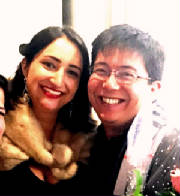 We found ourselves seats at a nice table alongside our good friends Pat and Michael, our neighbors Beth and Joe, and
Allegra’s boyfriend JP. Let the show begin!
Among the many other things I had worried about during the past few months was that this was not the typical
audience Allegra attracts whenever she performs. Few of the congregants were probably major
fans of jazz. They were most likely there in
order to support the temple and the good cause that would serve as the evening's beneficiary, the Rabbi’s Fund for Lifelong Learning. Yet, as Allegra noted in her opening
remarks, everyone was welcome and was going to
have a good time, whether they had come “to see jazz, or Jews, or jazzy Jews.” 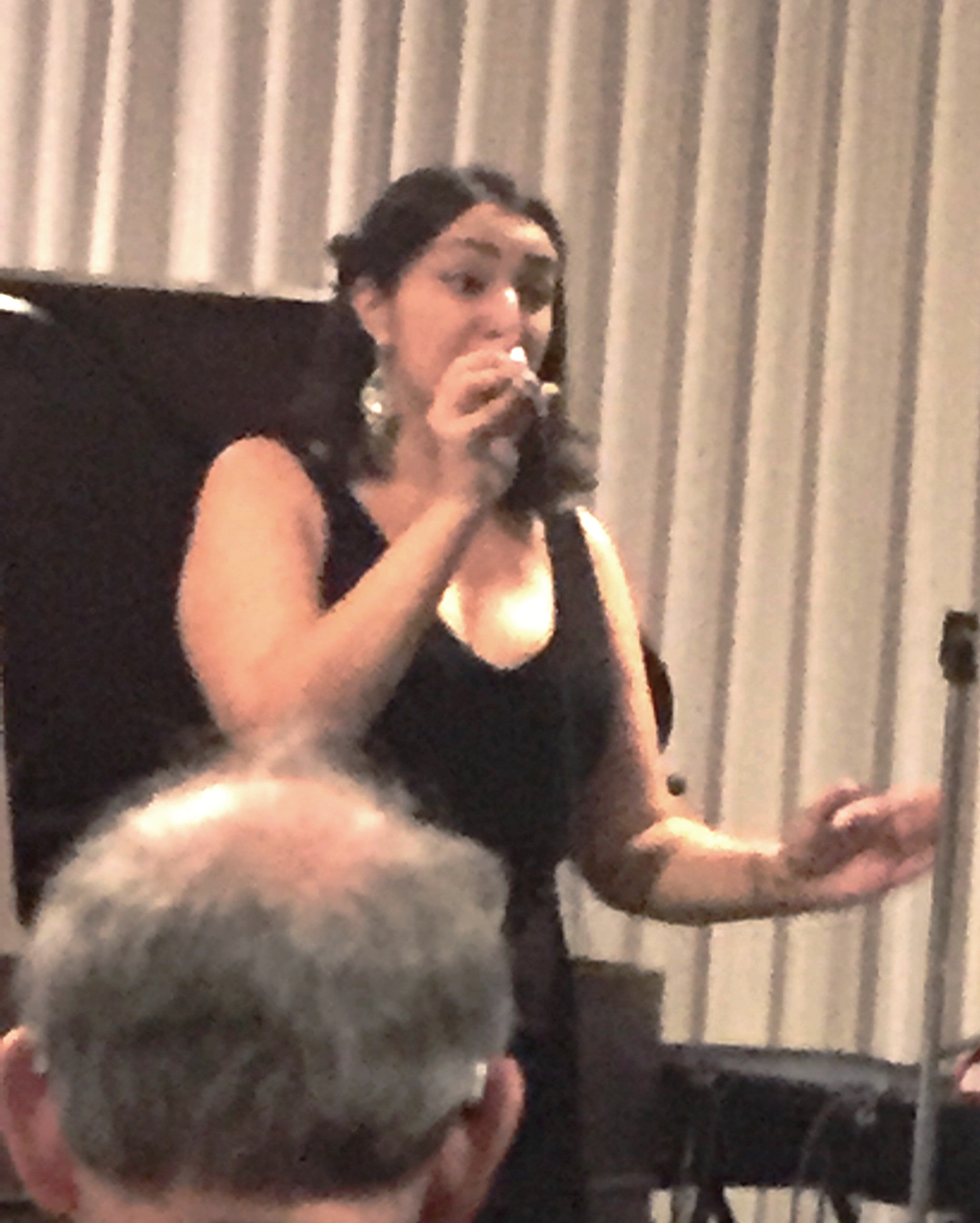 Then I held my breath as she launched into her first song. Although I generally
try to mind my own beeswax when it comes to her career (an assertion she would no doubt dispute), I had dared to weigh in
on her set list in this case. On my advice, rather than beginning with a lively but somewhat obscure jazz number, she started off with a rip-roaring
mash-up of two George Gershwin favorites, “’S
Wonderful, ’s Marvelous” and “You
Can’t Take That Away From Me.” Also
at my request, she included “Moon River,”
that universal crowd-pleaser from the movie "Breakfast at Tiffany's"
that she used to end almost every show with, but
hadn’t performed in front of me in years. 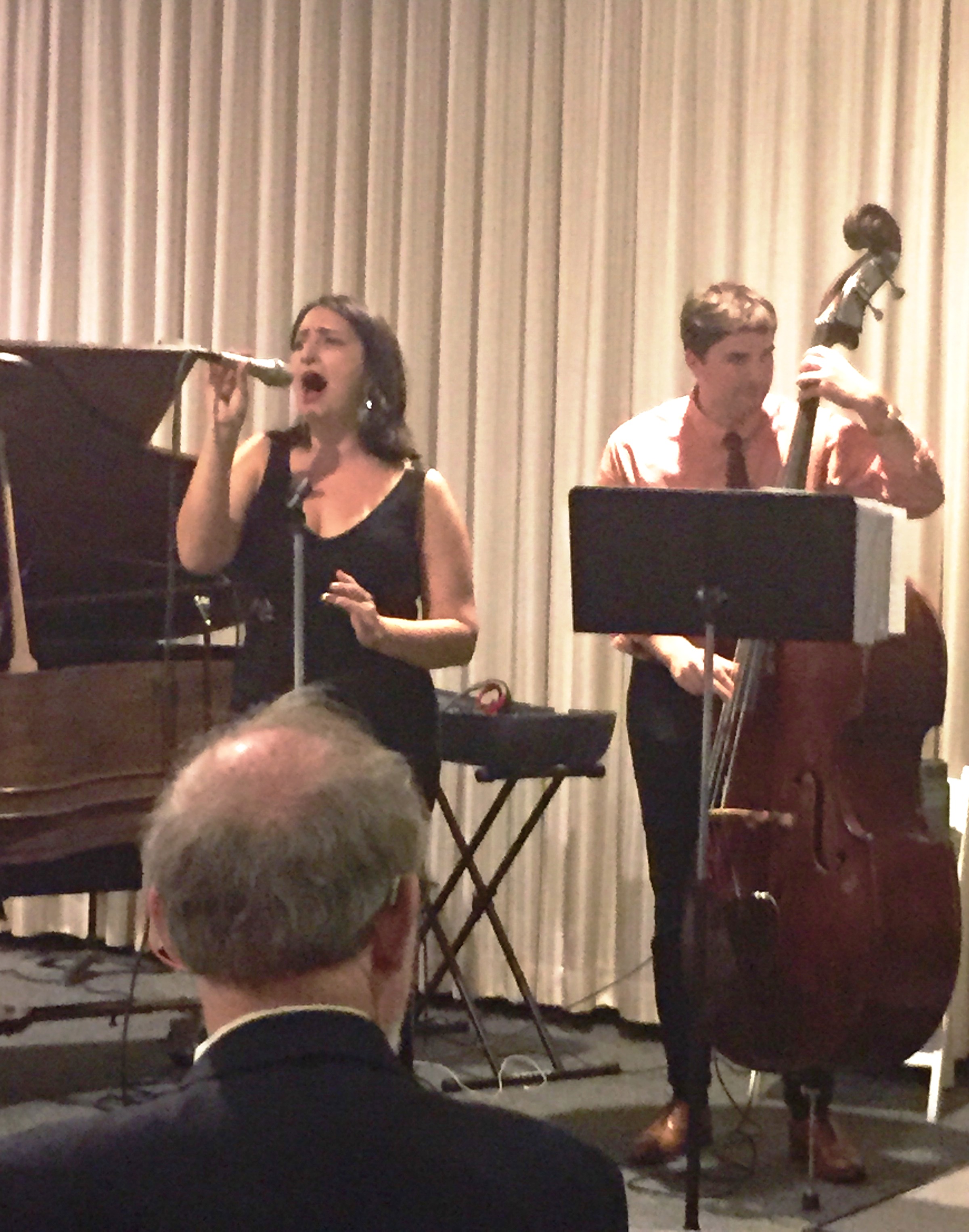 Then there was her own catchy, calypso-inspired version of a popular Beatles number, “I Will,” which also never fails to please. But a good portion
of the songs she performed were her own material, either from her album “Lonely City,” which consists of 11 original songs for
which she wrote both the words and music, or other tunes she had composed since
it was released last year. No matter. The guests may have been so unfamiliar with
jazz that even most jazz standards would not have struck a chord with them. And yet Allegra’s own songs did. As Gail,
the temple’s current affable and extremely gracious president, noted to me, my daughter’s own compositions sounded
like standards themselves and seemed very accessible. 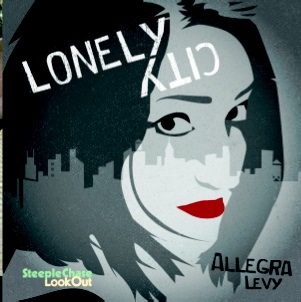 During intermission, while dessert and coffee were served, I raced back out into the lobby, where I had set up a small display of Allegra’s CD’s. Although I was indeed
there as a guest, I thought that the show might
be a good opportunity for her to sell her albums, and we had no one else there to sell them. 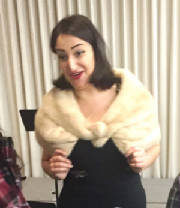 Soon enough, the second half of the show began, and still everything seemed fine. No, my
outfit was merely “fine.” Her performance was phenomenal. If I do say so myself. I have seen her perform in Hong
Kong, in Scotland, at countless New York City venues, and in a glitzy casino on the island of Macau. Yet never had I seen
her quite so polished and relaxed as she bantered between
songs, telling anecdotes and joking about
how being there reminded her of her bat mitzvah. Certainly, many of
the same people were there. As a special touch, given that this was at our temple,
she had chosen to “jazzify”
a popular Jewish song by Debbie Friedman that had
been sung to her at her bat mitzvah, “L’chi Lach”:
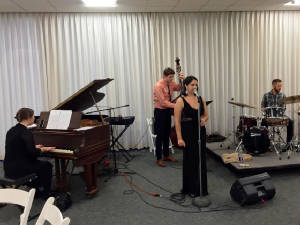 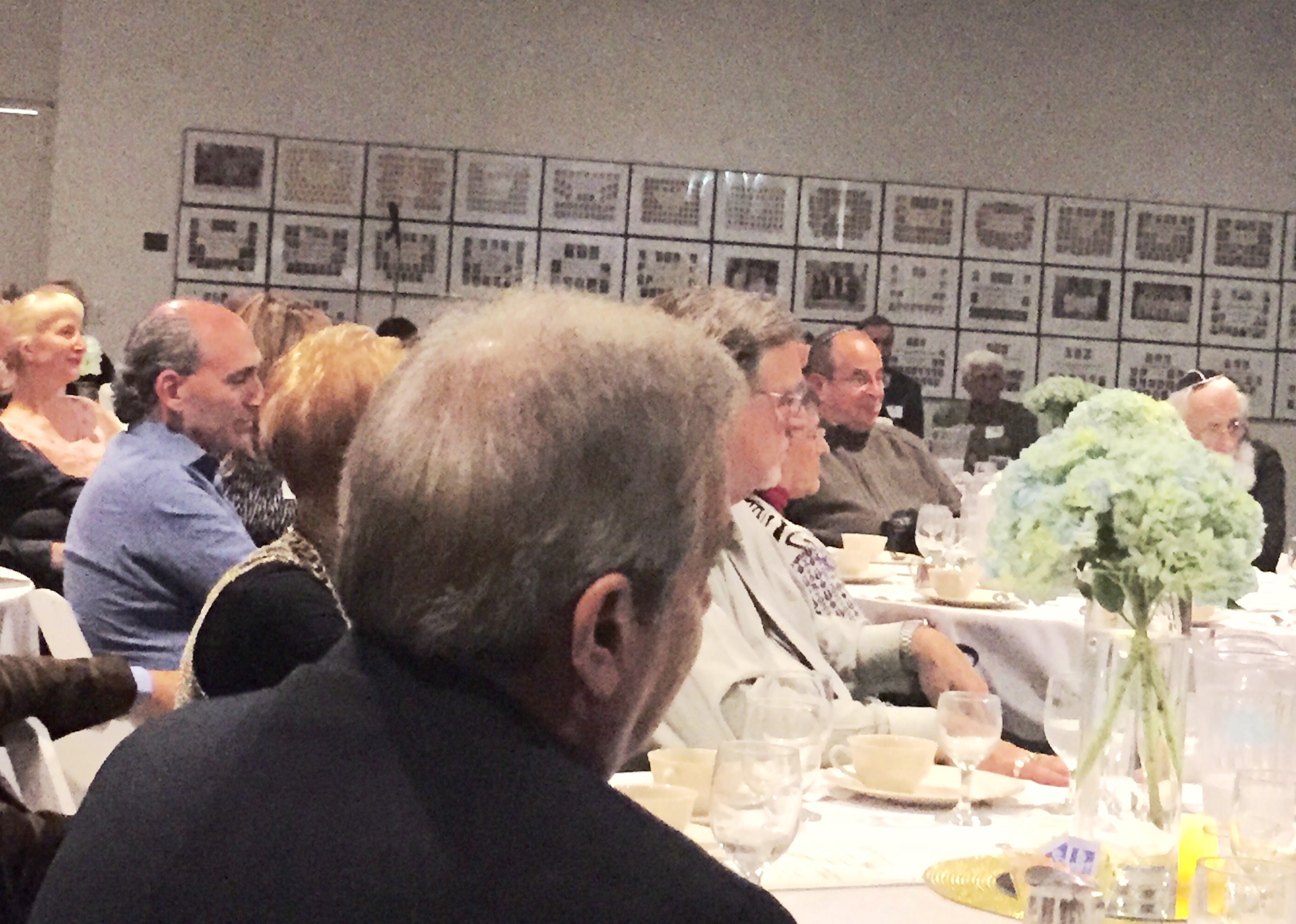 L'chi lach, to a land that I will show you
Leich l'cha, to a place you do not know
L'chi lach, on your journey I will bless you
And you shall be a blessing You shall be a blessing, You shall be a blessing, L'chi lach… As she sang it, I looked around the room and everyone seemed virtually mesmerized. Jazzy
Jews, indeed. 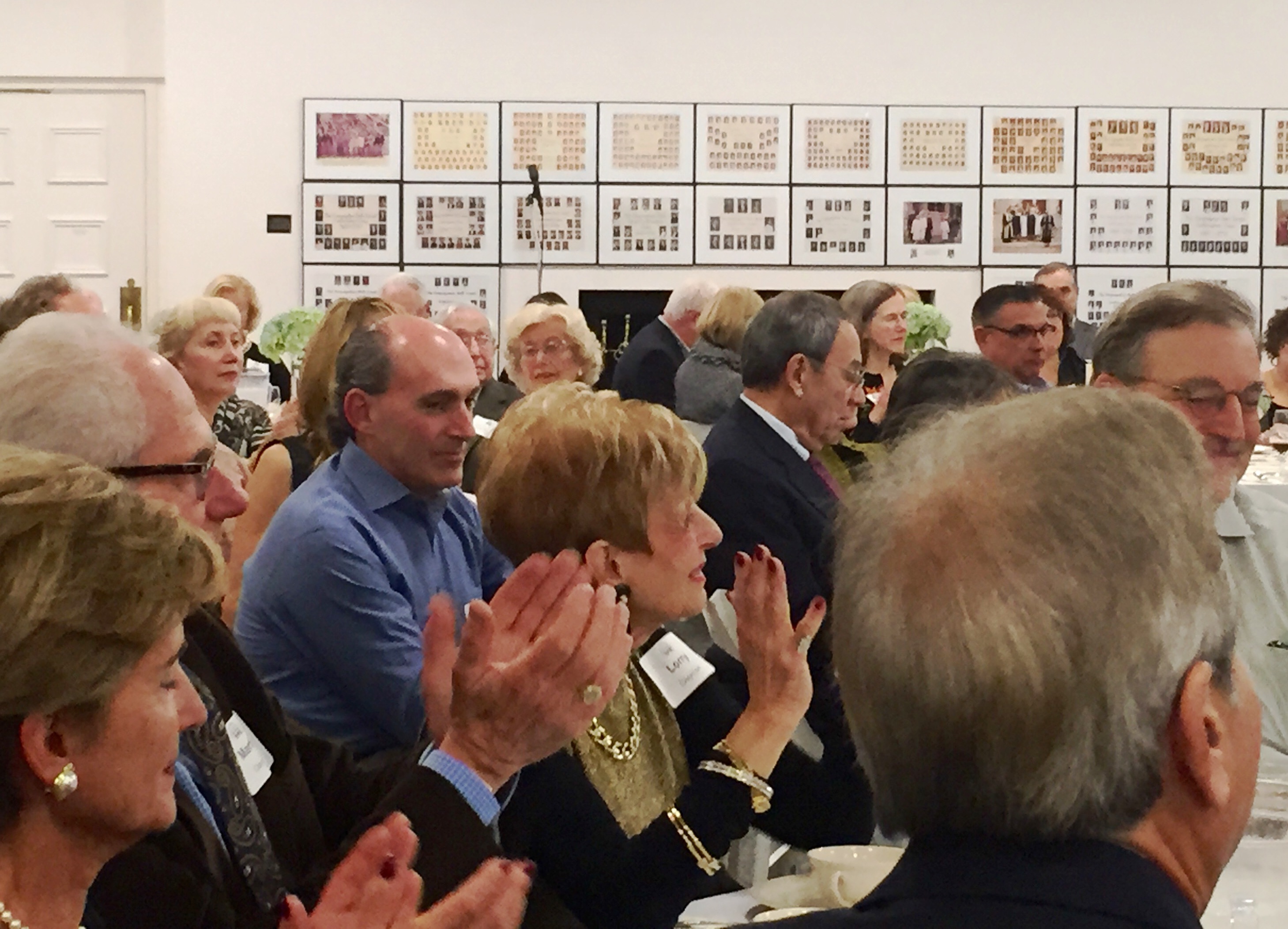 Then again, they seemed equally entranced when she sang my favorite number
from her album, “The Duet,” which goes in part like
this: It started small – just you and me, that’s all It wasn’t much – a kiss, a touch You never know what to expect.
Will it all work out? Will there be pieces to
collect? Will we give into our doubt…?” Despite all of my foolish trepidation, I had managed not to give into my own doubts. And when after the last note, the audience leapt to their feet in a resounding standing
ovation, and Allegra was presented with a mammoth bouquet of gorgeous pink roses, I knew that it was time to let go of my misgivings at
last. 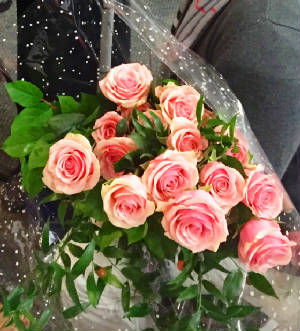 Or was it? Once again, this was no time to rest on my laurels – or latkes. Time to sell CD’s! I went back into the hall, where I was inundated not just with congrats, but credit cards. Fortunately, I had my trusty Square device plugged into my iPhone and was able to process them with ease, although to my relief many people offered cash instead. One enthusiastic congregant had come equipped with neither,
however. She said that she was eager to buy the CD, but had left both her wallet and checkbook at home. Was I willing to trust
her? She really wanted it. She would
mail me a check the next day. Under normal
circumstances, no one would sell something to someone they didn’t know with the promise of being paid at some later
date. This, however, was our temple. And this woman seemed so nice and so hopeful.
How could I possibly have refused? 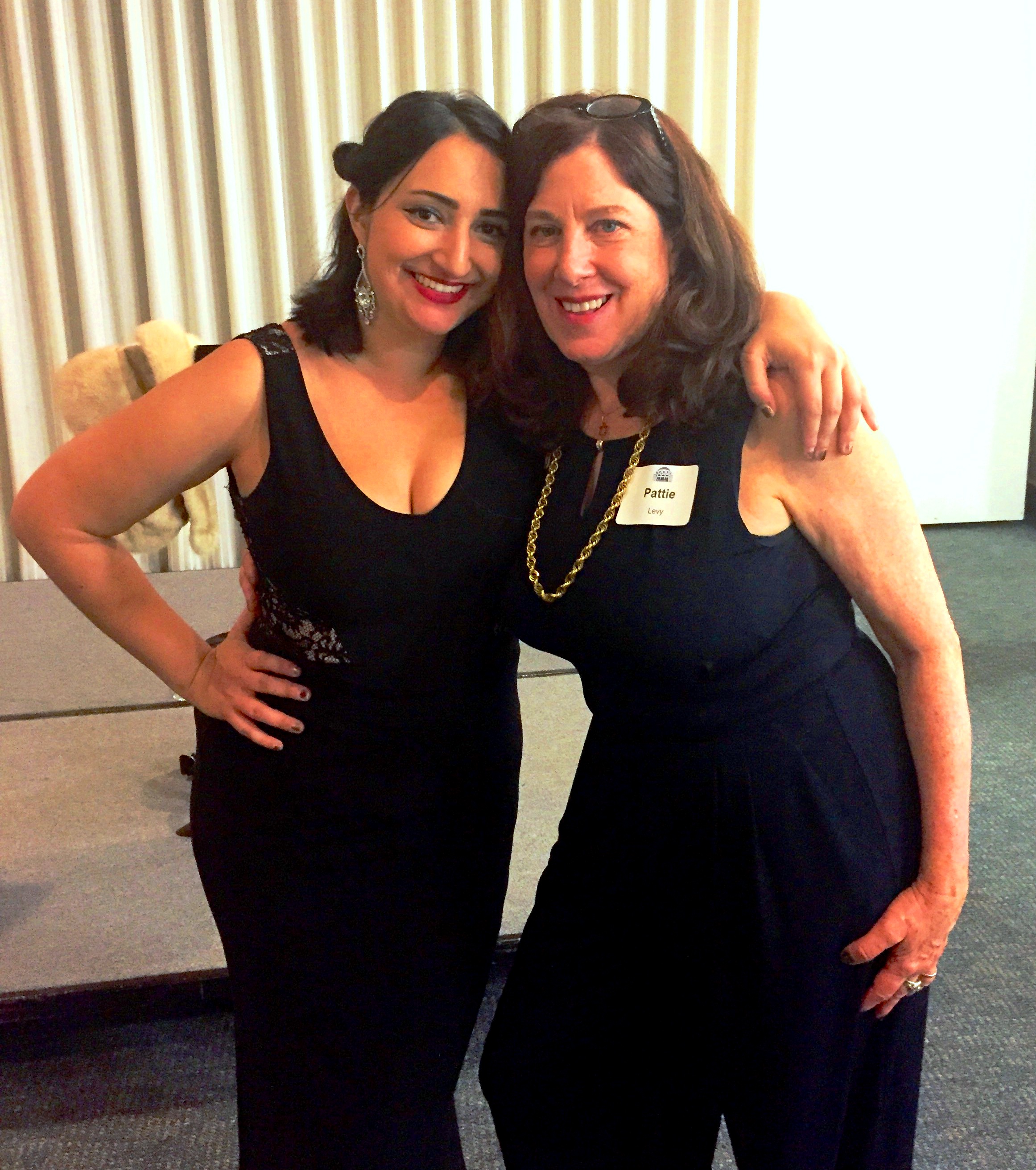 After I had sold for awhile, I went back inside to check
on the band and pose at last for a photo with my daughter. For me, that was among
the true highlights of the night. But
it was also one of my biggest mistakes. Because when we counted the money later, back at home, we discovered that although we’d sold 19 CD’s at $20 apiece, we only had been paid for 17 of them. Even factoring in the nice woman I had agreed to trust, we were still $20
short. Had I screwed up processing a sale on my Square device? Had I managed to misplace a $20 bill in the excitement of the moment? Or had someone at our temple actually deigned to pinch a CD from us? Yet it was only $20. If this was the worst thing
that would befall us there, I’d live. 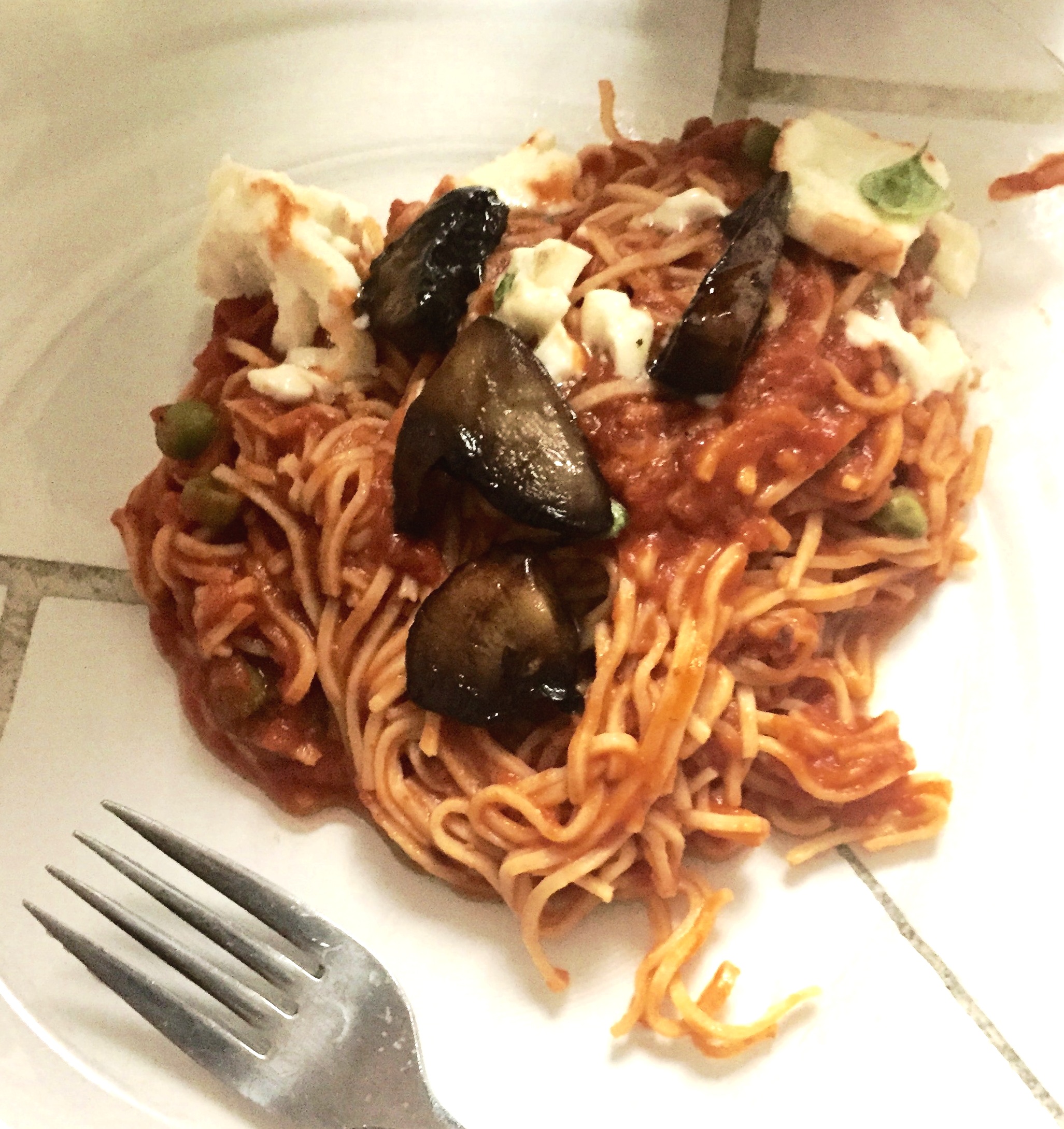 As often happens after a show, Allegra invited the band and
other friends to come back to our house afterwards. And as ALWAYS happens after a show, all of them were absolutely famished. So after I’d put out the various hors d’oeuvres I had prepared in advance and the plates
of cookies I had baked, I cooked up a huge vat of fresh angel hair pasta covered
with marinara sauce, fresh mozzarella, sautéed portabella mushrooms, and freshly
grated parmesan. And then I served it to the kids, who sat around in our living room eating, drinking wine, and schmoozing until past midnight. 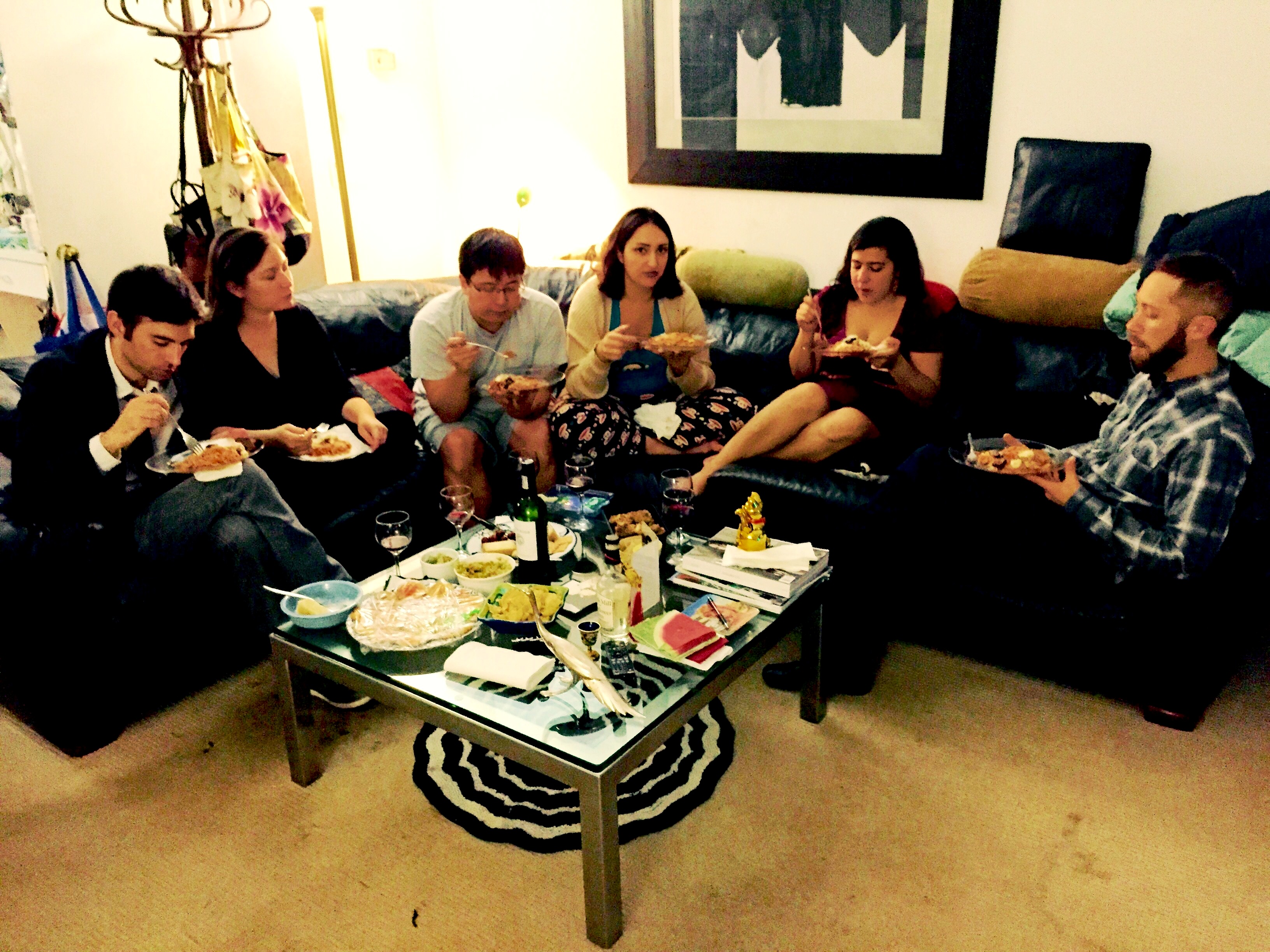 Carmen and her boyfriend stayed over, as did Allegra and JP, and the
next morning I made everyone a lavish brunch before we began receiving calls and emails congratulating us on the show. It was time to let go of my foreboding
now, wasn’t it? But then the other
shoe dropped. 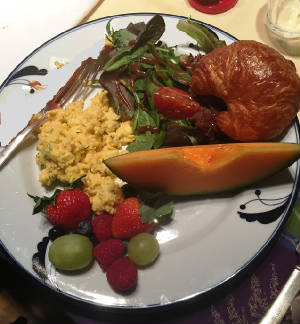 Late that night, after we had returned from dinner
and a movie, Allegra received an email from a woman at the temple. She wanted
to send Allegra a check, but had forgotten how much they had agreed to pay her. According to her recollection, though,
they owed her only half or three-quarters of the amount that they had in fact agreed upon. Allegra insisted it was no big deal and that she would
write back in the morning to remind them. But I went
into full-blown panic mode. I was the one who had negotiated the rate at a meeting. Yet I had never put the amount in writing, and neither,
it turned out, had she. The only evidence I had were my notes from the meeting and a text message I’d sent to Allegra specifying the price, to which she had texted back her agreement. 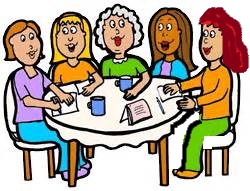 Maybe I was just a mom. Not a mom-ager. A mom-ager would have put it
in writing. Allegra had already
paid everyone else in the band, who had all since dispersed. Would
it end up after all her effort that she would actually lose money on the gig? Going into my customary nice Jewish mom guilt mode, I felt
that it was all my fault. So I could hardly sleep that night. The next morning, though, Allegra did write to the woman, who replied right
away to reassure her that there was
no problem and they would mail her a check
for the full amount that very afternoon. And that was that. Phew!  Now I could finally relax. And maybe rest on my laurels (and latkes) just a little bit. To top things off, that nice woman from the temple also mailed a check for the CD. And over the past week, I have been inundated with rave reviews from everyone I know who was
there. “What a bodacious performance!”
wrote our friend Lorry, going on to compliment Allegra’s silky voice, stage presence, and "patter" between
songs. “We knew her when!” “Allegra is so talented and ‘composed!’”
wrote Mary-Jane. So, exactly how big is my chest?
You don’t want to know.
Friday, October 23, 2015
A Word From the Weiss 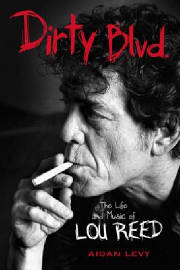 As I told you last week, my son Aidan was scheduled to read
from his new book DIrty Blvd. on Sunday Oct. 18th in our town, and I felt entitled to crow (and yes, kvell) about it. But when you’re a nice Jewish mom – particularly one with children who do creative things – you don’t
get to sit around and rest on your laurels (or latkes). You need to help do the work.
At least I feel inclined to help.  There have been all kinds of stories in the press
lately about parenting styles, comparing “concierge parents” (who virtually
serve as their grown children’s employees, doing everything from watching the grandchildren to walking Spot) to “lighthouse parents” (who have the characteristically WASPy self-restraint to stand by silently and serve as distant beacons of guiding light).  Anyone who knows me fairly well or ever reads this blog must sense where I fit into that scenario. I feel inclined to help. Of course, my
son Aidan had done all the real work. He’d
written an actual book. But like almost anything, it would take some effort – on my behalf, I felt –
to make sure that this event was well-attended and that he sold as
many books as possible. So along with putting up posters around town, and
alerting a local newspaper, the Connecticut Jewish Ledger, I emailed invitations to 85 or so of our neighbors and closest friends. 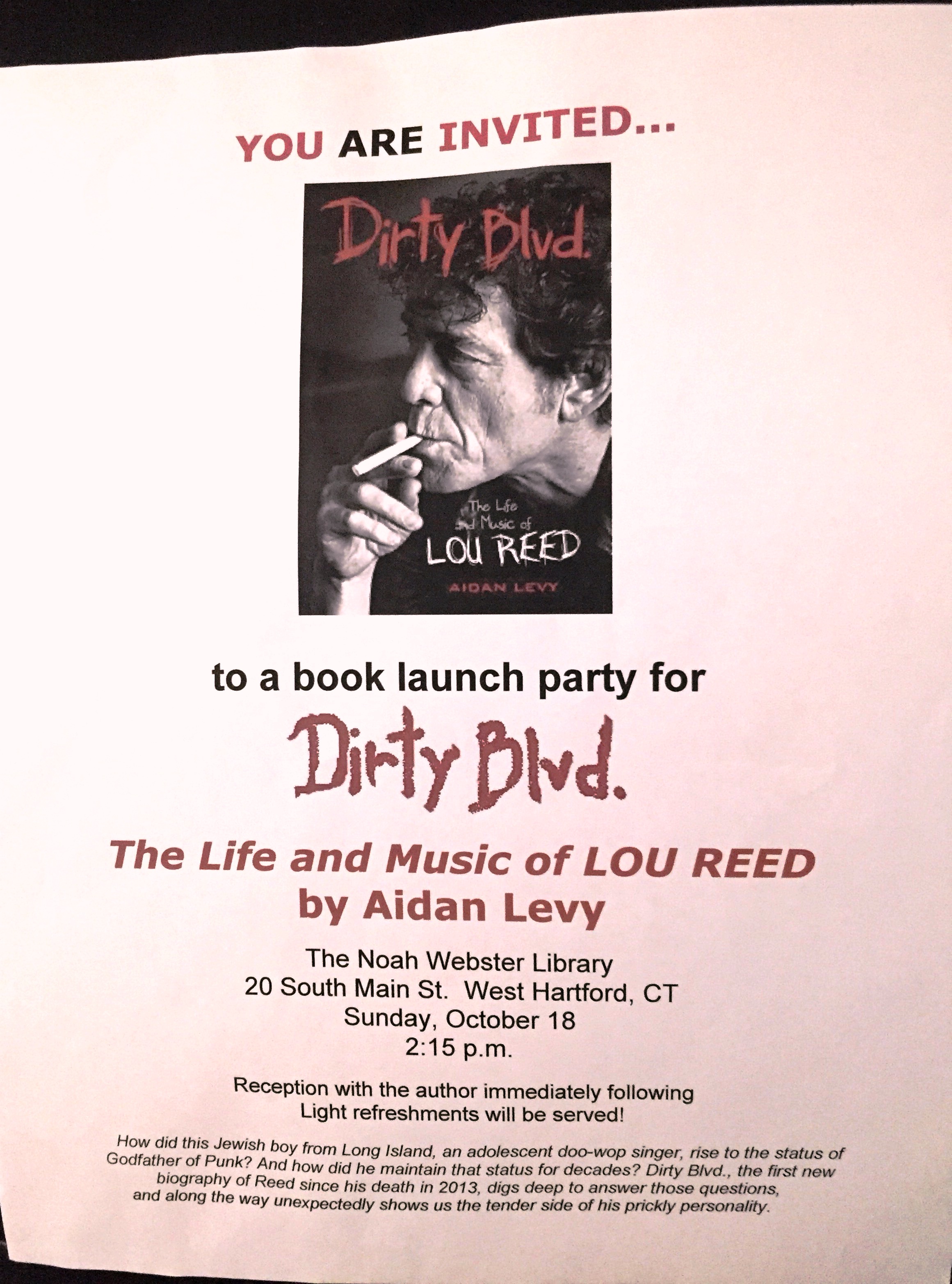 And if some of those
people, along with a few complete strangers, were going to take the time out of their
busy weekend to come hear my son discuss his book, and perchance also buy it, we couldn’t expect them to just
sit around and kvell along
with me. They deserved to have a little nosh. Didn’t they? At the very least, a little nosh afterwards would make the event a whole lot nicer. Aidan contended that after he’d done the reading at a local library, it would be best to move the party to a restaurant
and let everyone pay for their own food and drinks. I didn’t agree. That may be just fine for kids in their 20s, whose birthday parties are often
held these days in bars where everyone shells out for their own schnapps. But for
the birth of this book, I felt that it was only appropriate that we serve as hosts and foot the
bill. I also believed it would
be most convenient for all involved if the after-party were held right on the spot, rather than expecting anyone to accompany us to yet another location. But
that meant we would have to provide the food ourselves. Not to mention drink.  I was so excited about this milestone in my son’s life that I would have been happy to toast everyone with champagne, or at least a nice little
vintage of some sort. But the library agreed to let us hold a reception on the premises only on the condition that no alcohol whatsoever be served. Oh, well! We would simply have to celebrate with apple cider. Well, not just apple cider. We would also need something to eat. Assuming that my son would be irate if I went into my usual bar mitzvah
mode, I decided to scale down and economize
a bit. And the best way to do that, I figured, was
to bake myself. 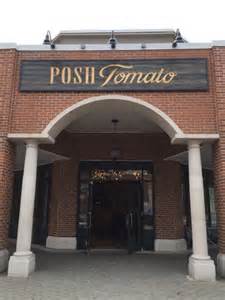 I had noticed
that a relatively hip new pizza place called The Posh Tomato had recently opened right next door to the library. Its owner agreed to also deliver an assortment
of his piping hot, paper-thin-crusted Margarita pies the moment that the reading ended. Wouldn’t that be much cooler than the usual – cheese and crackers –
anyway? 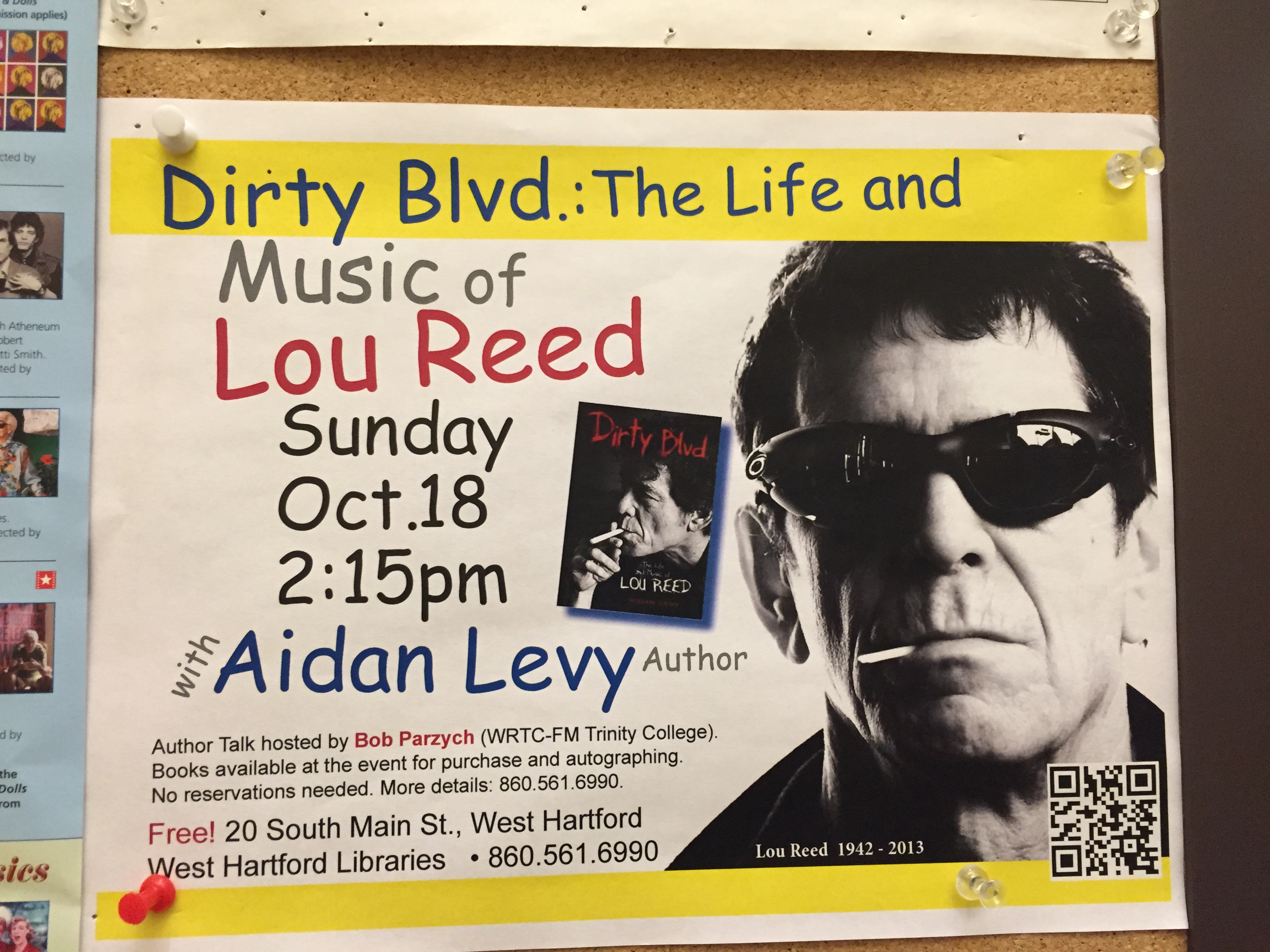 It was wise of Aidan to have chosen to hold the event at the public library. They do an ace job of publicizing events by sending out emails and putting up cool posters around town (far cooler
than the ones I had designed). To my slight frustration, they chose to state that no RSVP was necessary. So I had no clue
how many people we might end up needing to feed. To my
even greater frustration, the Connecticut Jewish Ledger did an awesome cover story on Aidan and his book, but provided the wrong location for the reading. Jews around here all read the Jewish Ledger. How many might go to the wrong place? The library said that they typically drew about 40 people for book readings. About 30 people we knew also planned to
attend. Then again, the best-laid plans
of mice, men, and nice Jewish moms often go awry. So we could only guess at best. 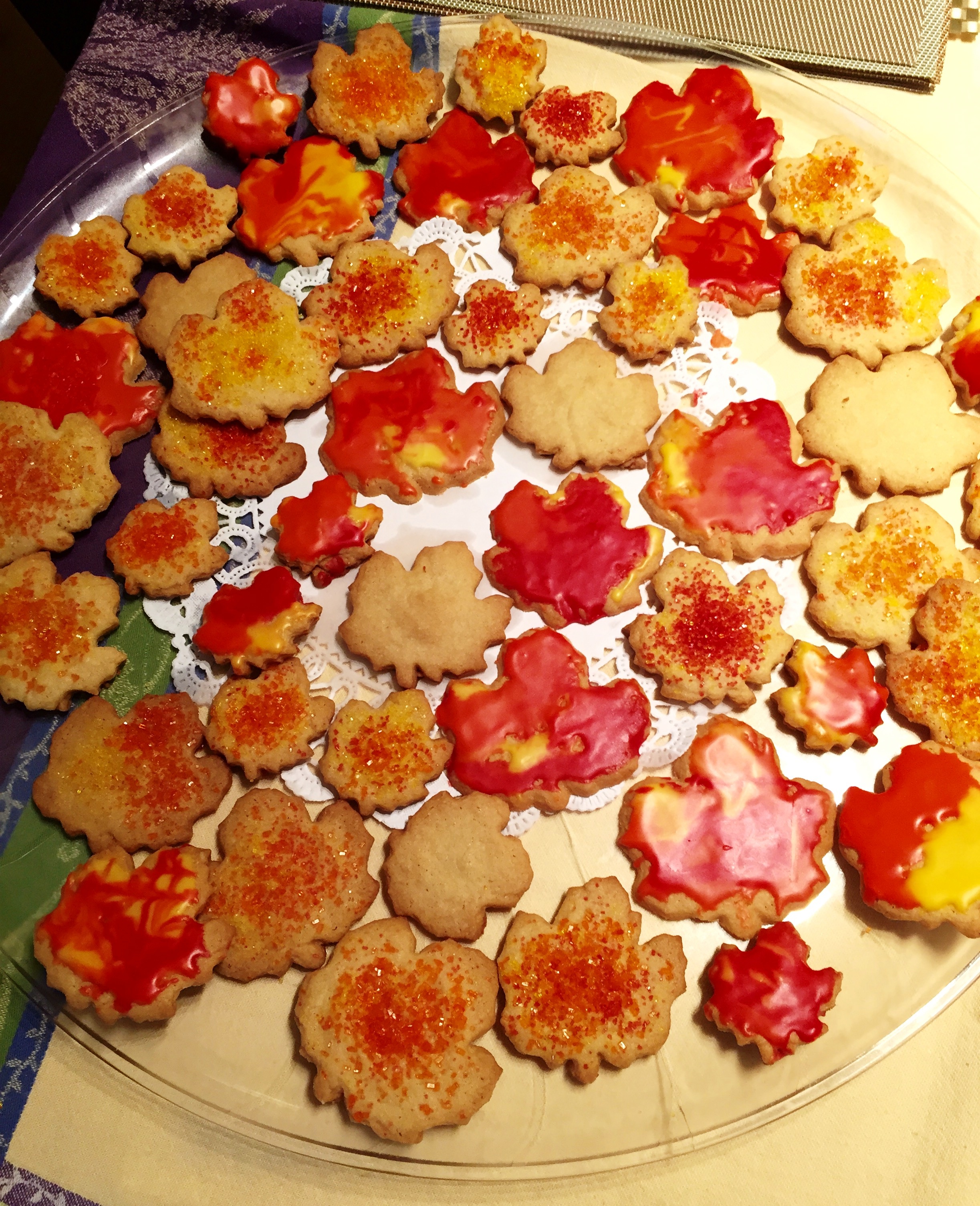 Being a nice Jewish mom, I approach all events involving
food with the same motto: Too Much Is not Enough. G-d forbid anyone should ever leave my house or one of my parties hungry! So after purchasing the cider and other non-alcoholic beverages, as
well as an array of party goods in a red and black color scheme to match the
cover of the book, I spent all day Saturday baking four different kinds of cookies, including
chocolate chip, sugar, and peanut butter, as well as a batch of chocolate chip cookies that were gluten-free just in case. 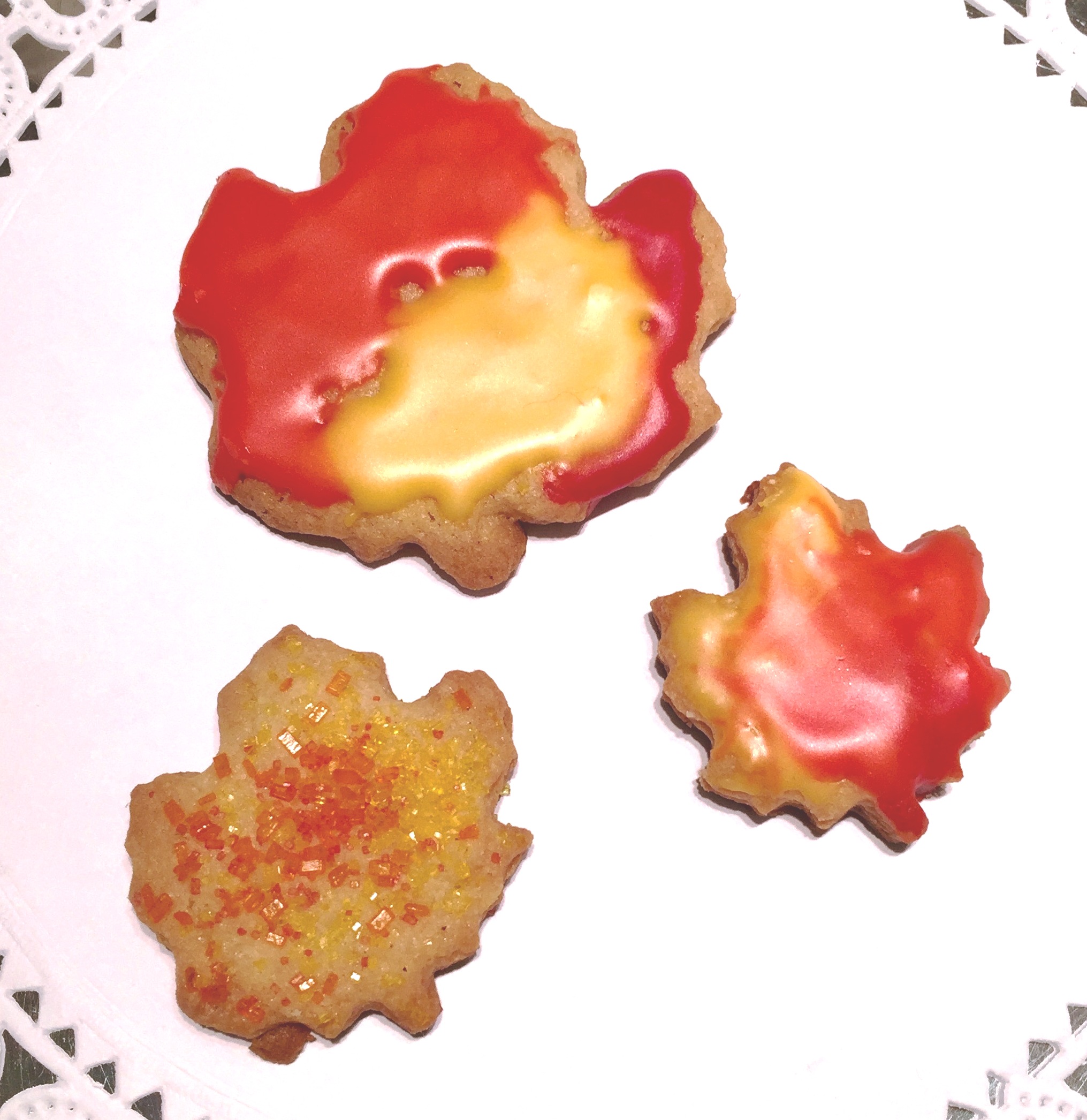 I also decorated many of the sugar cookies to resemble autumn leaves, then dipped a few dozen strawberries
in white and dark chocolate.
“What is all this?” Aidan asked with mild horror
when he and his fiancée Kaitlin arrived from NYC Saturday night. “There are probably only going to be 15 people there.” Only 15? Was he kidding? Either way, I didn’t
believe that he was right. But even if he were, the worst case scenario was that we'd end up with a whole lot of cookies,
with gluten and without. So much for my diet.  After I had prepared a nice brunch for everyone on Sunday morning, it took no
small effort to load all the food, drinks, and assorted accoutrements into the car,
then carry them into the library. We’d made it a point to arrive early in order to set up and start my giant coffee pot brewing. But to our distress the event room was locked. So I went into the
nearest department to see if someone might be willing to open it. It was the children’s wing, where I took one look at the librarian and
did a double take. “Oh. My.
G-d. Dee?” I asked.  Since my youngest child is nearly 26, it had been going on two decades since I’d ventured
into this cheery section equipped with playthings
and pygmy-sized upholstered chairs. But once upon a time, at least two decades
ago, that had been our stomping ground of choice.  Back then, it had been presided over by a vivacious and dynamic woman named Dee.
And apparently it still
was. I began babbling like a blithering idiot
about how a little boy to whom she had once often read aloud was there because he was about to read aloud from
a book that he had written himself. 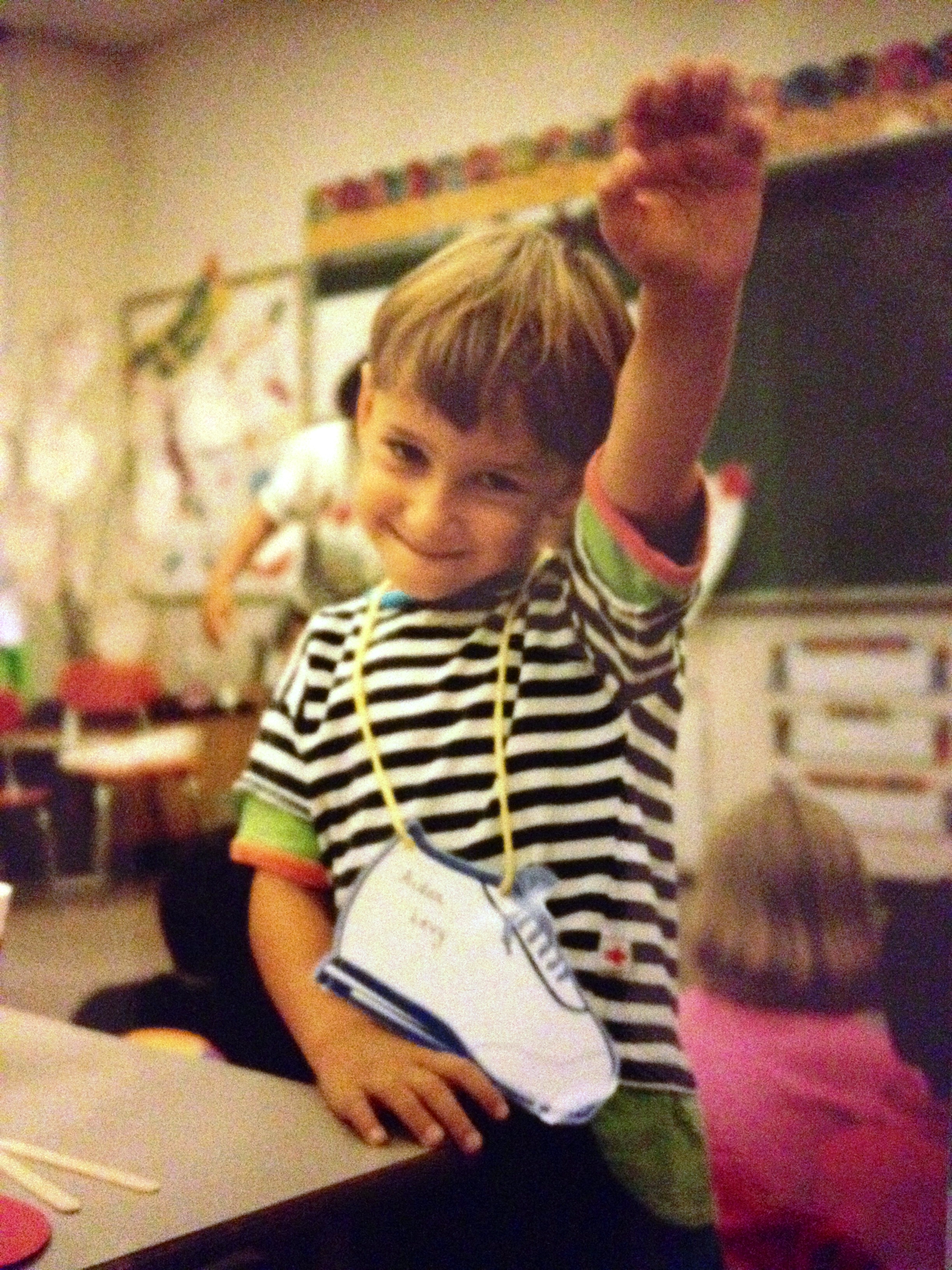 I say “idiot” because Aidan chose that
moment to join me. And even if at 29 he was no
longer the sweet, wide-eyed preschooler he
had once been, she not only recognized him instantly, but also remembered his full name. She had no trouble recalling my daughter’s
name as well, and began recounting stories about her, such as the time that Allegra at age 3 or 4 had complained to her that some little boys were bothering her, but then had summoned the chutzpah to make them
stop it all by herself. 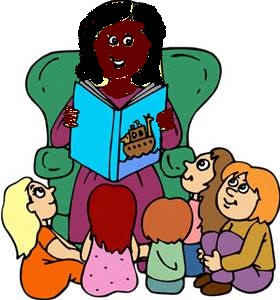 Was this just pure coincidence, or was it one of those chance encounters that put things
instantly into perspective? It suddenly seemed like only yesterday that my son had been sitting in the Kiddy Corner listening
to Dee read Dr. Seuss. And now he was getting his doctorate and about to read from a book
that he had written himself. It was all I could do not to lose it then and there. Good thing that there wasn’t a minute to spare or to stand around weeping and waxing nostalgic, as we nice Jewish
moms are wont to do. It was time to make the coffee.
Meanwhile, Kaitlin hastened to begin setting up all the party goods and platters. 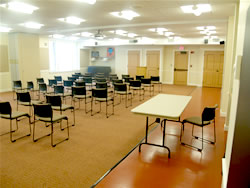 A fellow named Joe who
runs community programs at the library
soon arrived and began pulling chairs
out of a closet in the back and arranging them in perfect rows. My heart sank a bit when he
stopped after he’d reached about seven rows of six. I may not by
nature tend to be one of those “the glass is half-full” (vs. half-empty) people, yet did he really think we wouldn’t need any more than that?
But then people began steadily wandering
in. And continued steadily wandering in. People we knew. People we
didn’t know. So many people that we needed more chairs. Then more chairs.
So many more that we finally ran out of chairs. 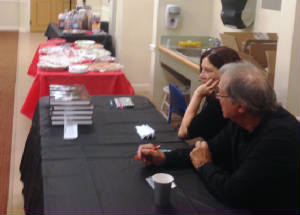 My husband and I had planted ourselves at a table way in
the back, beside Kaitlin, ready to begin selling books as soon as the reading ended.
We also had arranged to have the pizza
delivered as soon as the reading ended. The question was, when would it end? The
book, as I have noted, is called Dirty Blvd.: The Life and
Music of Lou Reed. And although it was only released this
month, it has continued to rack up good reviews. “Skillfully written and respectful,” said a publication called Booklist, stating that “Levy has produced an informative and insightful look at a
rock star and songwriter whose work always cut a little deeper than that of his peers.” 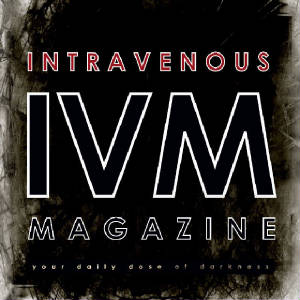 “Well
worth your time,” concurred a hip music
and culture magazine called Intravenous, noting that “the writing style is engaging; empathetic in places, critical in others, but
very even handed in its depiction of both Reed the man and Reed the artist. It... keeps an authoritative tone and distance that elevates it to the level of such rock bios as 'Dear Boy: The
Life of Keith Moon' by Tony Fletcher, 'The Beatles' by Hunter Davies... and 'Strange Fascination...'
by David Buckley." Then there was a publication called Library Journal.
“…about as close to a must-read book on Reed as one can get,” it said. 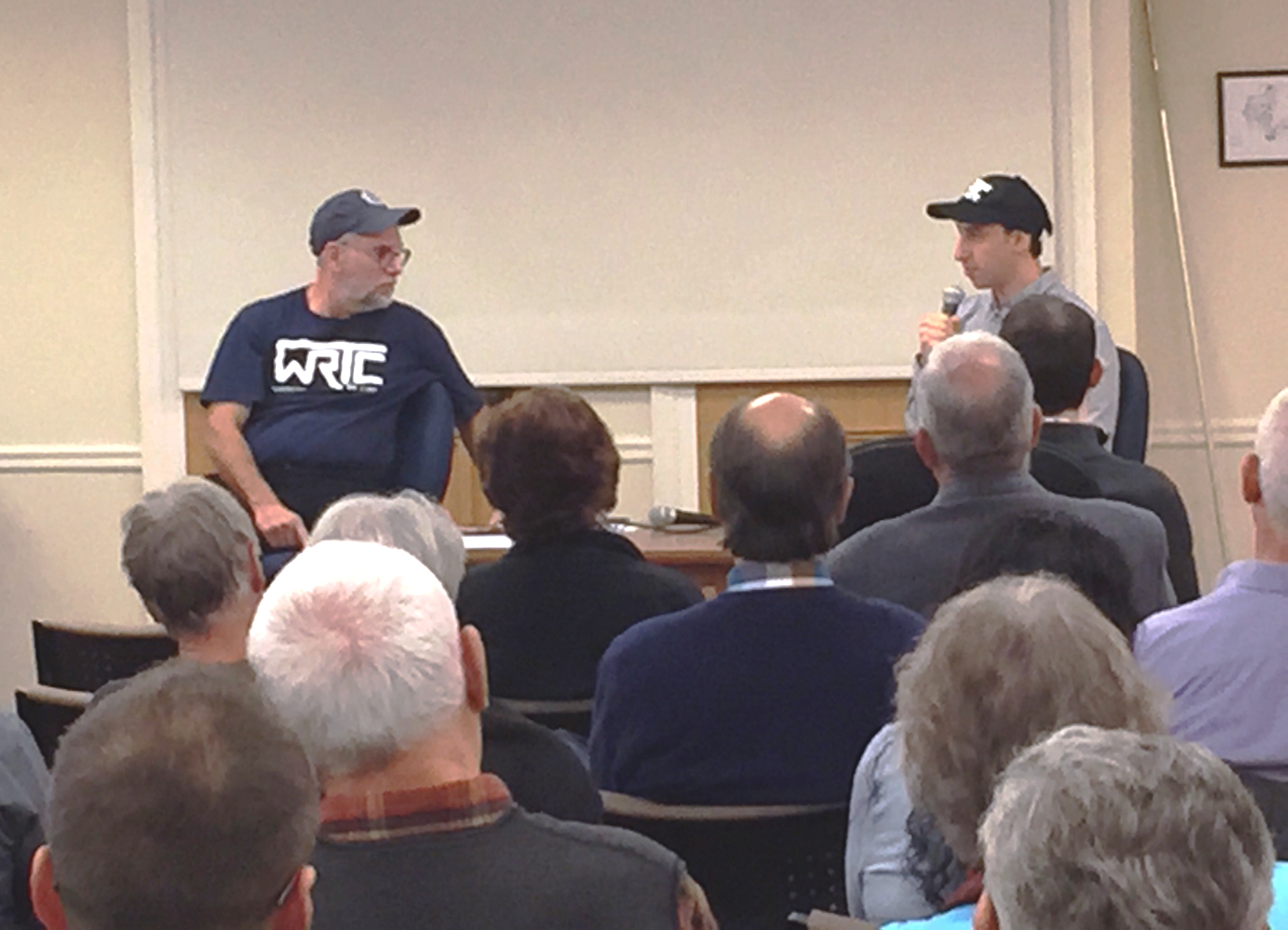 After Aidan read from a few select portions, interspersing this with playing musical selections from
the late rock icon’s repertoire, including “Sweet Jane” and “Walk on the Wild Side,” he had arranged to be interviewed by a man named Bob from
the Trinity College radio station, where Aidan had once hosted a jazz radio show while still in high school. (It was Bob who
presented him with the WRTC-FM cap he
wore throughout the event.) And after Bob had run
out of questions, he opened the forum up to the audience.
Who had many questions of their own. Many, many questions. 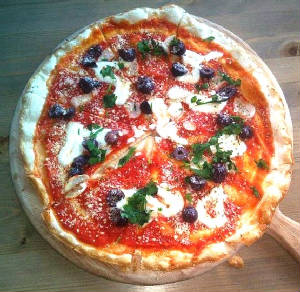 I had worried that
few of the people we’d invited knew much if anything about Lou Reed. But the many
strangers who had wandered in knew more than enough to make up for that. The reading had been scheduled to end at 3:15, and the pizzas arrived
promptly shortly before that time. But the questions went on and on. I tried to keep in
mind that the real purpose of this event was reading. Not feeding. But weren’t
the 10 pizzas sitting inside those cardboard boxes growing awfully cold? 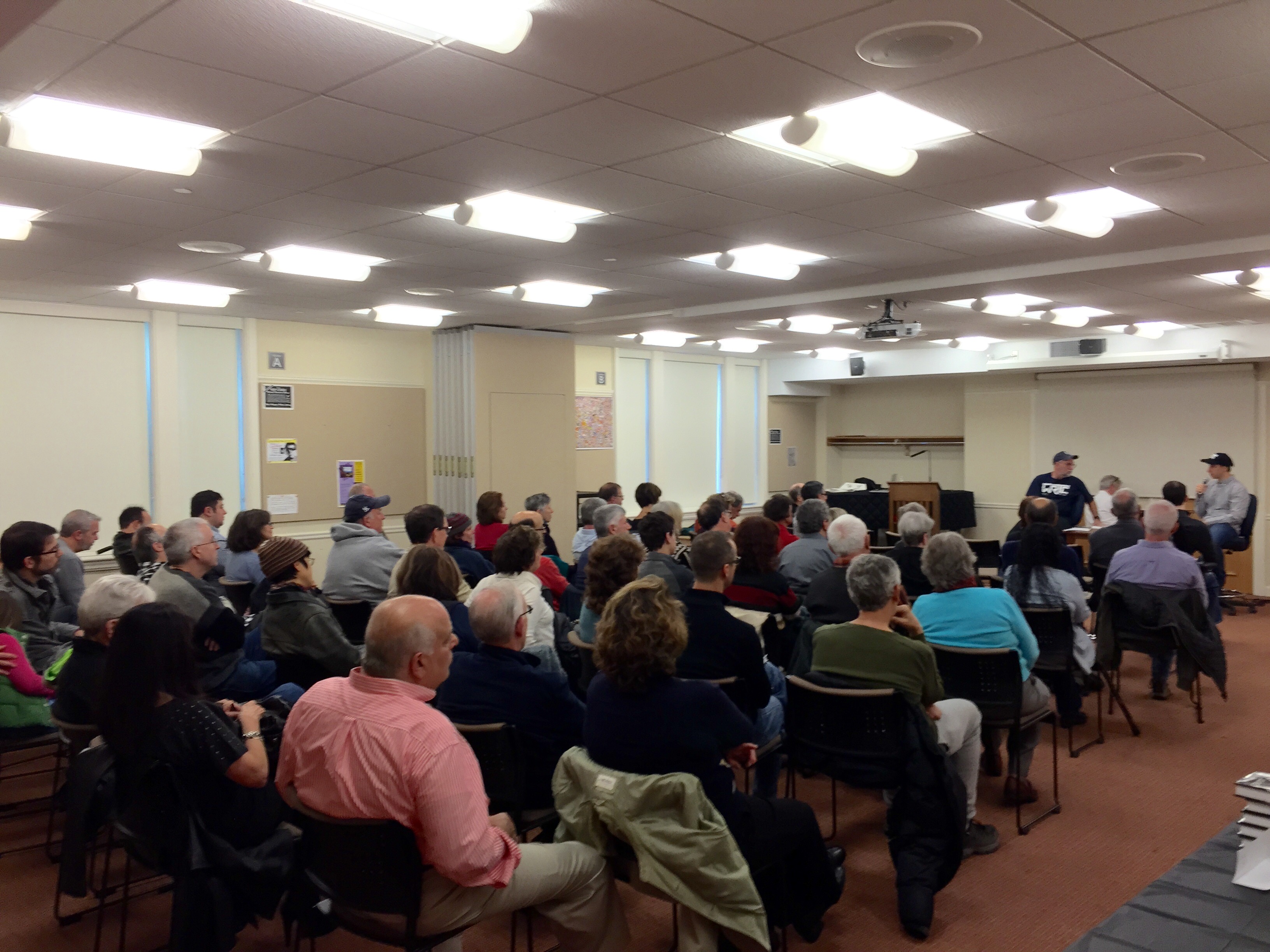 After about 20 minutes, I raised my own hand and posed what I thought might be a definitive enough question to end the discussion. I noted that Mr. Reed, who’d been as infamous for being abrasive as he’d been famous for his music, had never
been known as a great humanitarian. But another new biography about to be released evidently focused on the negative side of the equation, claiming that he’d been abusive to many of his romantic partners, and it characterized him as “a monster.” Aidan had initially approached the subject of Reed reverentially.
Had his writing the book changed that? I'd tossed out the term “great
humanitarian” trying to be funny, but it turned out to be fortuitous that I'd phrased it that way, because this prompted
Aidan to enumerate the many ways in which Reed had in fact been altruistic, participating
in an array of charitable causes. So I ended up learning something.  He then went on to explain (and I only wish I
could remember how he articulately put this) that despite the inevitable stories about Reed’s irascibility, many of
these incidents had been drug-induced. Sure, he had not just walked but also lived on the wild side, and had done more than
his share to alienate people, particularly the press. But in the end most of his
friends and loved ones had revered him despite everything and had spoken of how kind Reed had been capable of being as well. Aidan would later say that mine was the most difficult question anyone had asked. Unfortunately, it was far from the last question anyone asked. Because after he'd finished answering it, Bob asked if there were any more questions, and half a dozen hands went up.
After another 10 minutes, I could stand the thought of the chilled pizzas no longer. I stood up and began removing the plastic wrap from my copious trays of cookies. I don’t know if
this was a clear signal to Bob or the crowd that things had gone on long enough. Or if perhaps the aroma of freshly baked
chocolate chip cookies said this for me. 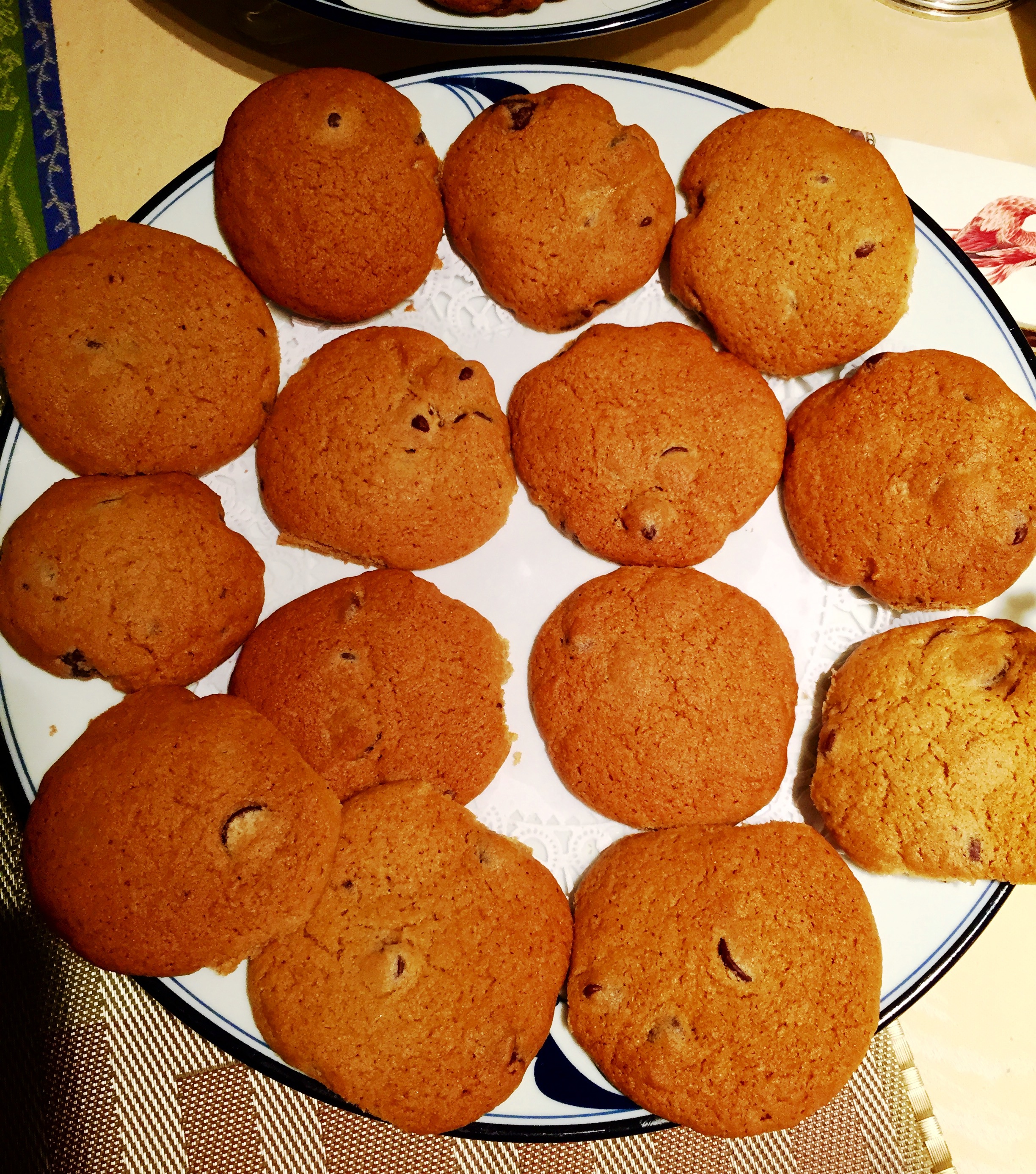 But they suddenly all ran out of questions. Let the feast begin! I don’t know how cold
the pizzas were by then, because my real work had just begun.
OK, here’s the great thing
about a library: You’re completely surrounded by books. Here’s
the bad thing, if you’re an author (or author’s nice Jewish mom): None of
them are for sale. And if you want to sell your own book – or your son’s book – you have to do it yourself. To avoid having to do that, or having to estimate how many books to order, Aidan had arranged to sell and sign the books in the Barnes & Noble next
door afterwards. But for those who might not would want to stick around for the reception and then walk to yet another location,
we had ordered some books to sell at the reading as well.  The only problem was that now we had to do the selling, And by “we,” I mean me. To accommodate
people who might not have cash on them, and to avoid having to make change, I had registered online weeks earlier for a program called Square.
They send you a little white plastic doohickey that you plug into your mobile phone. All you have to do is enter
the amount you’re charging on the phone's screen. Then you slide someone’s credit card through the device, get them
to sign their name with their finger,
and voilá – the money goes
into your bank account, minus a minor service charge of 2.75 percent.  Pretty cool, huh? I had practiced doing
this a couple of times the night before, charging a dollar on my own Visa. Nothing to it. At least there was nothing to it
in the privacy of my own home. The moment that the reading ended, a line of eager buyers formed at my table, and that
made me a little more flustered. But somehow, between my husband accepting cash and my using Square,
we managed to sell all 19 books we had brought.
Meanwhile, everyone seemed to be having a fine time chowing down on pizza and cookies and downing the various low-test libations, but mostly schmoozing with each
other. Maybe this was good practice for Aidan’s wedding next June. Because afterwards, I was so tired that I felt like I had thrown a bar mitzvah. And all I could think about was all the people I had barely gotten to say hello to because I had been busy selling books. 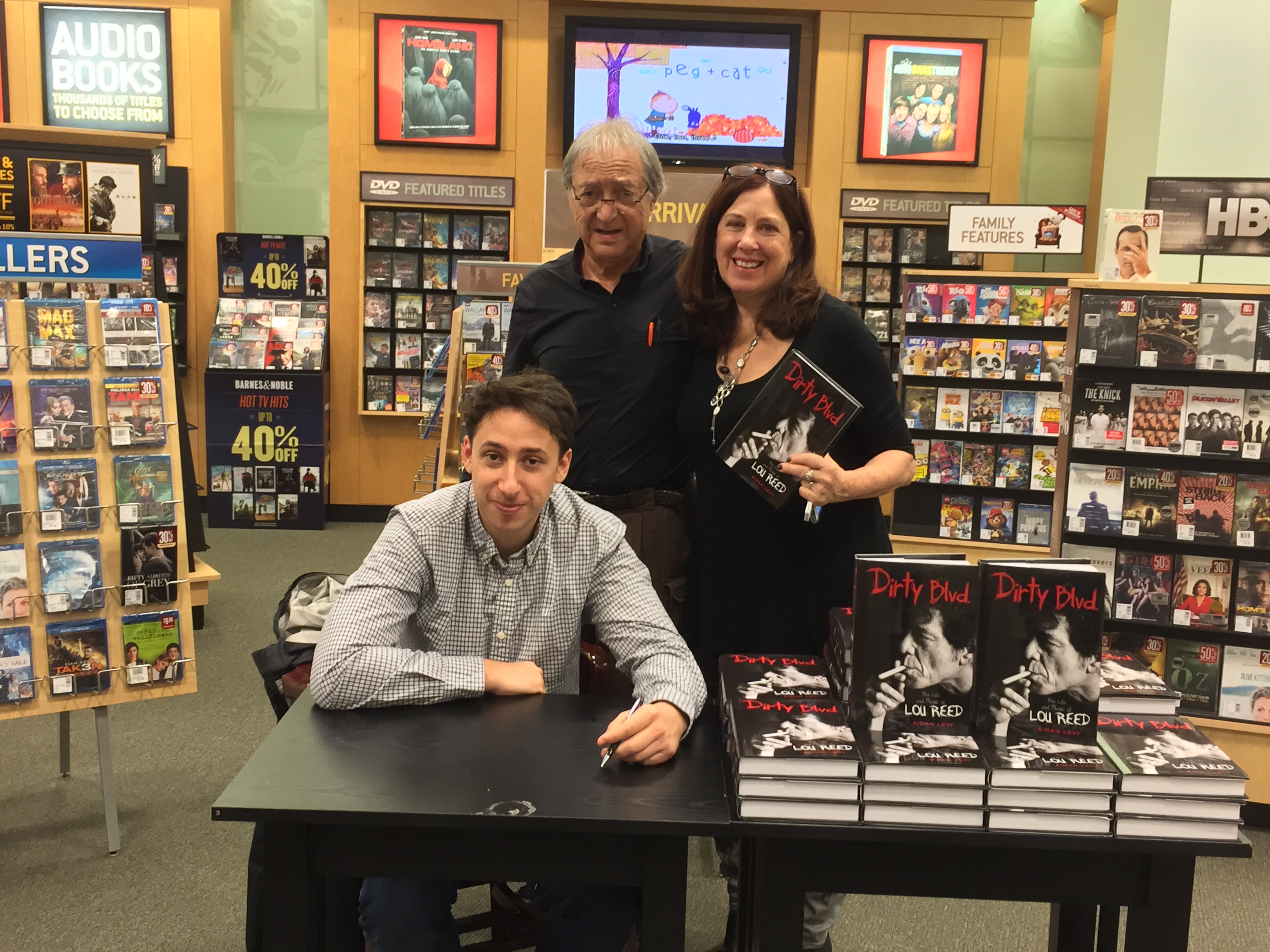 When the reading, eating and schmoozing was
over, Aidan went next door to Barnes
& Noble, where they set him up at an author table and
he managed to sell even more books, although not before posing for a few pictures with dear old Mom and Dad.
And with Kaitlin, of course.
And when he was done at last and we had loaded the few leftovers back into the car, all I could think was a resoundingly
euphoric, “We did it!” 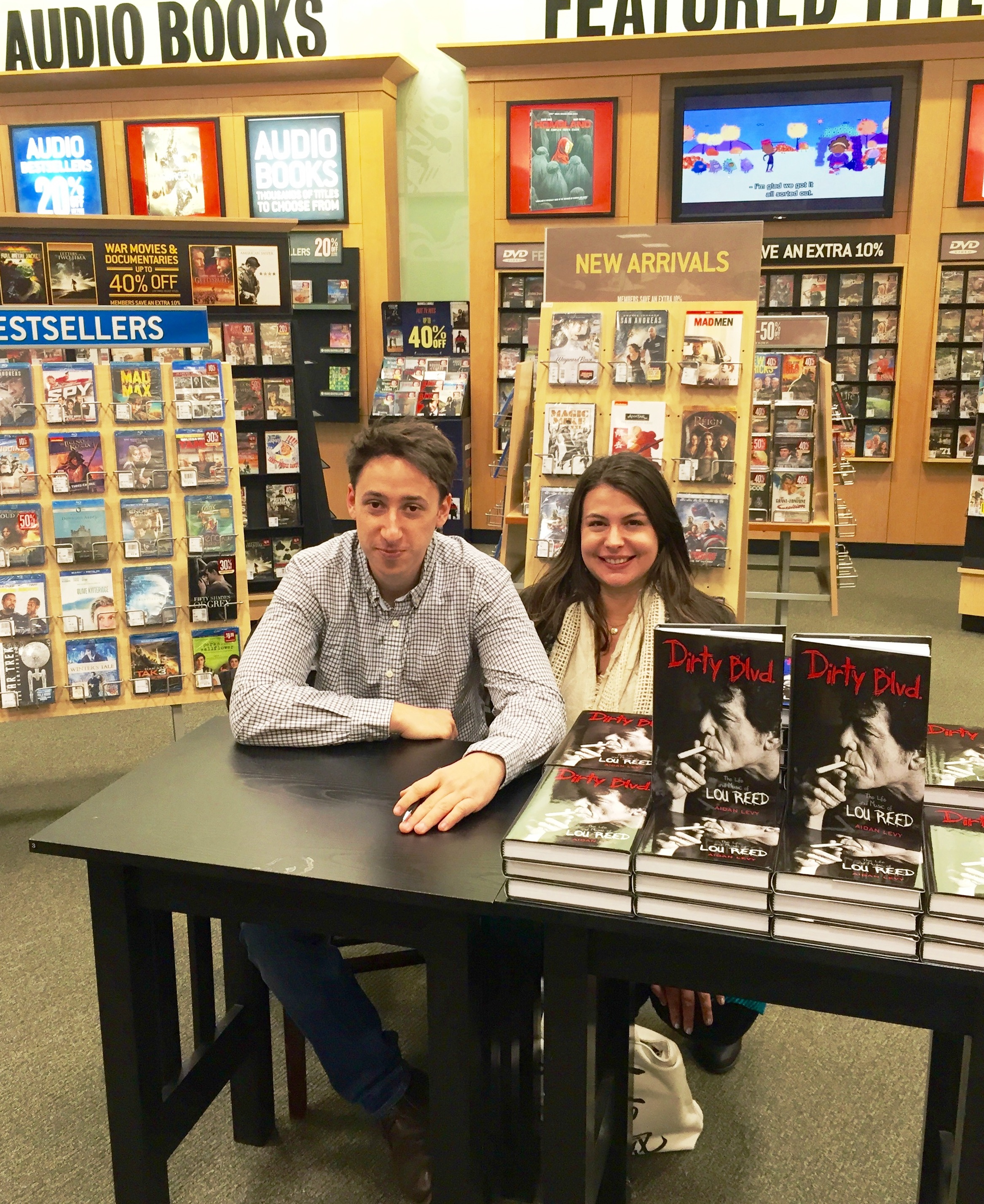 Well, he did it. All the real work, I mean. He managed to write a book and get it published. All
we did was help. I know. As a parent of grown kids, I realize that our offspring
think we don’t have a clue. But sometimes I think they’re the ones who don’t
have a clue. I mean, do they have any idea how exhilarating it
is for us now and then to recapture the thrill of getting to be of help to them? 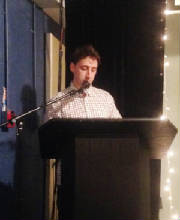 I doubt it. But I
know that Aidan was grateful for all my efforts in the end. Not only did he say so,
but he wrote something very sweet in my copy of the book.
Also, a few days later he asked his sister to bake for his next
reading, held at a bookstore in Brooklyn called WORD, indicating that he realized things actually were nicer with a nosh. 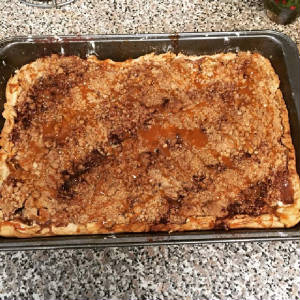 What Allegra baked, of course, was a pan of homemade caramel-drizzled apple squares using
apples she'd picked herself and caramel made by her boyfriend JP. Which
is to say that both of my children have now easily managed to outdo my own efforts. But that is exactly as it should be, is
it not? 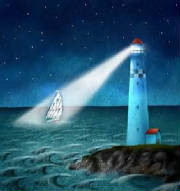 Maybe someday, when
I’m gone, my memory can stand for my children and grandchildren as a beacon, a example of well-meaning motherhood that serves as a silent guiding light back to safety in a storm.  But for now, I would just as soon continue baking, selling, or whatever the heck else it
takes to help. Just call me NiceJewishConcierge.com.
Tuesday, October 13, 2015
A Word From the Weiss  We’ve all heard of an embarrassment of riches.
Well, this month I have something even better than riches, and therefore you
might say even more embarrassing. An embarrassment
of naches.  My daughter Allegra is performing at a big concert in our town because she has been booked to sing at our synagogue’s annual fundraiser. (If you have to know, and you just happen to
live in Connecticut, it will be held at Congregation Beth Israel in West Hartford on Saturday, October 24, and tickets cost $50 including
drinks, dinner, and a concert featuring Allegra and her amazing band.) Meanwhile,
my son Aidan just released his first book, Dirty Blvd., a biography of curmudgeonly rock icon Lou Reed of The Velvet
Underground (best-known for such classic rock songs as “Walk on the Wild Side”
and “Sweet Jane”).  My husband and I proudly attended the NYC release party last week at a hip store on the Upper West Side called Book Culture, and future readings will
be held at WORD, a bookstore in Greenpoint, Brooklyn, on
Thursday October 22 at 7 p.m., and at the Noah
Webster Public Library in West Hartford, CT this Sunday, October 18 at
2:15 p.m. That means that if you’re friends with me on Facebook, or you drive around
my town, you can’t help coming across postings or posters promoting one or the other of my children. 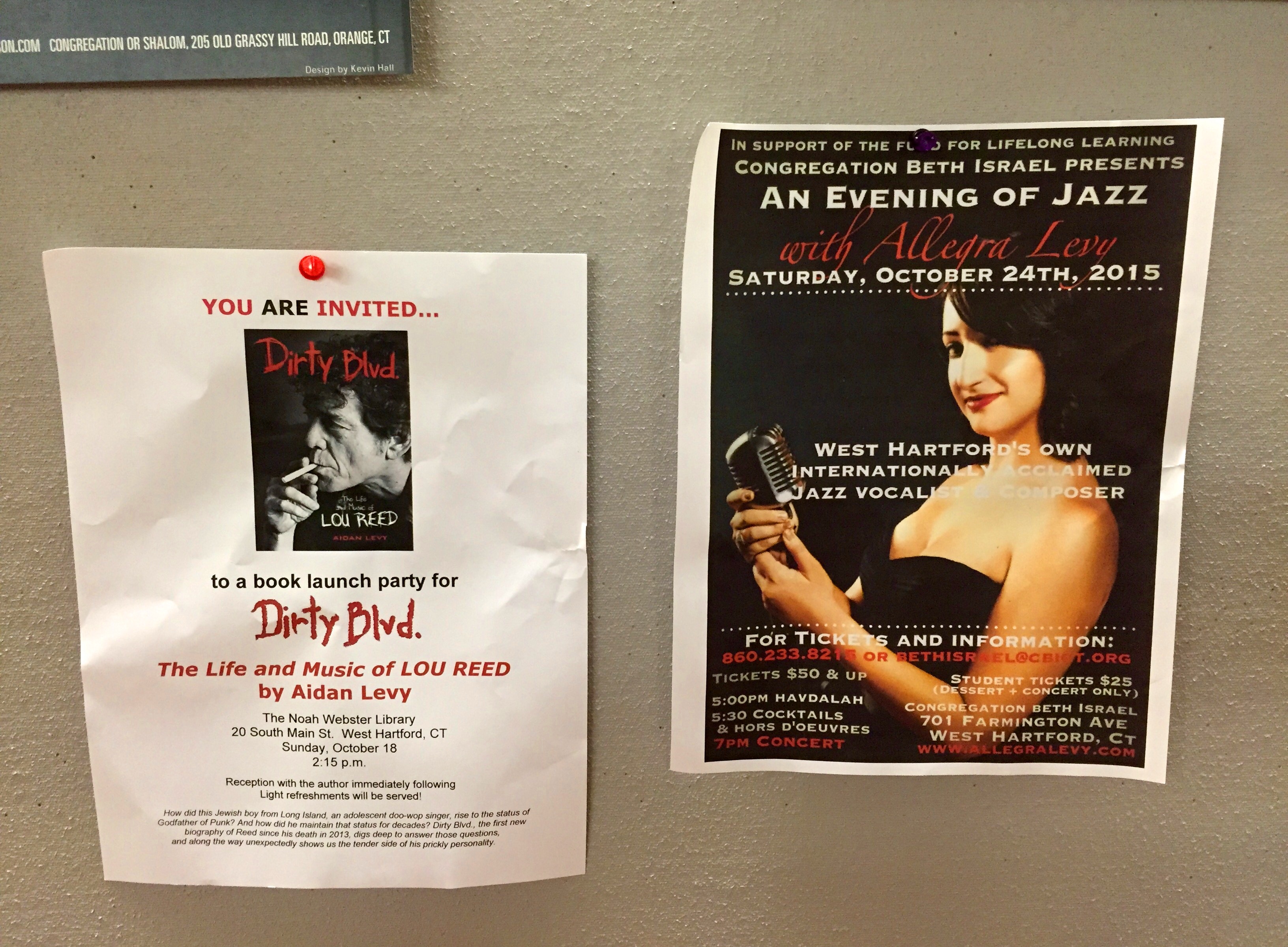 Granted, I’ll admit that I put up most of those postings and posters myself. But that just makes me feel even more embarrassed.
I don’t want you to think I’m one of those mothers who blabber endlessly about the accomplishments of their kinder (even if it sometimes
seems I do just that in this very space). After all, I also kvetch about my children now and then in this space.
Plus, those posters featuring Allegra in a black strapless dress were put up mostly to help my synagogue (even if they also do at the
same time help promote her). 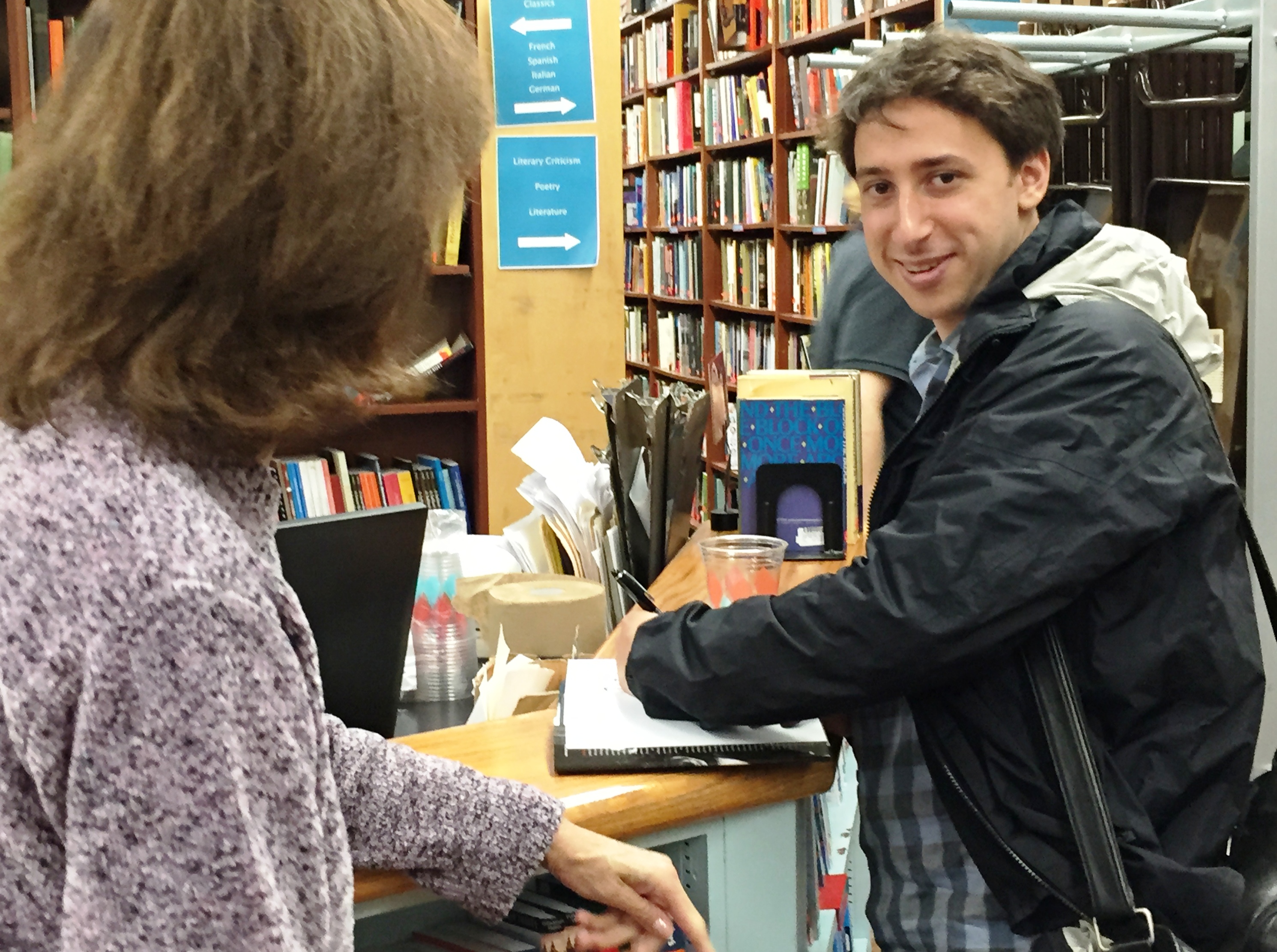 As for Aidan, he’s one of
those people who are modest to the max, which more
than makes up for anything I could ever do to promote him. Even though his father and I are longtime journalists, with assorted media connections (to the local press, at least), Aidan explicitly
ordered us not to help hype his book in any way, as though it were a state secret. Or actually were embarrassing in some way. 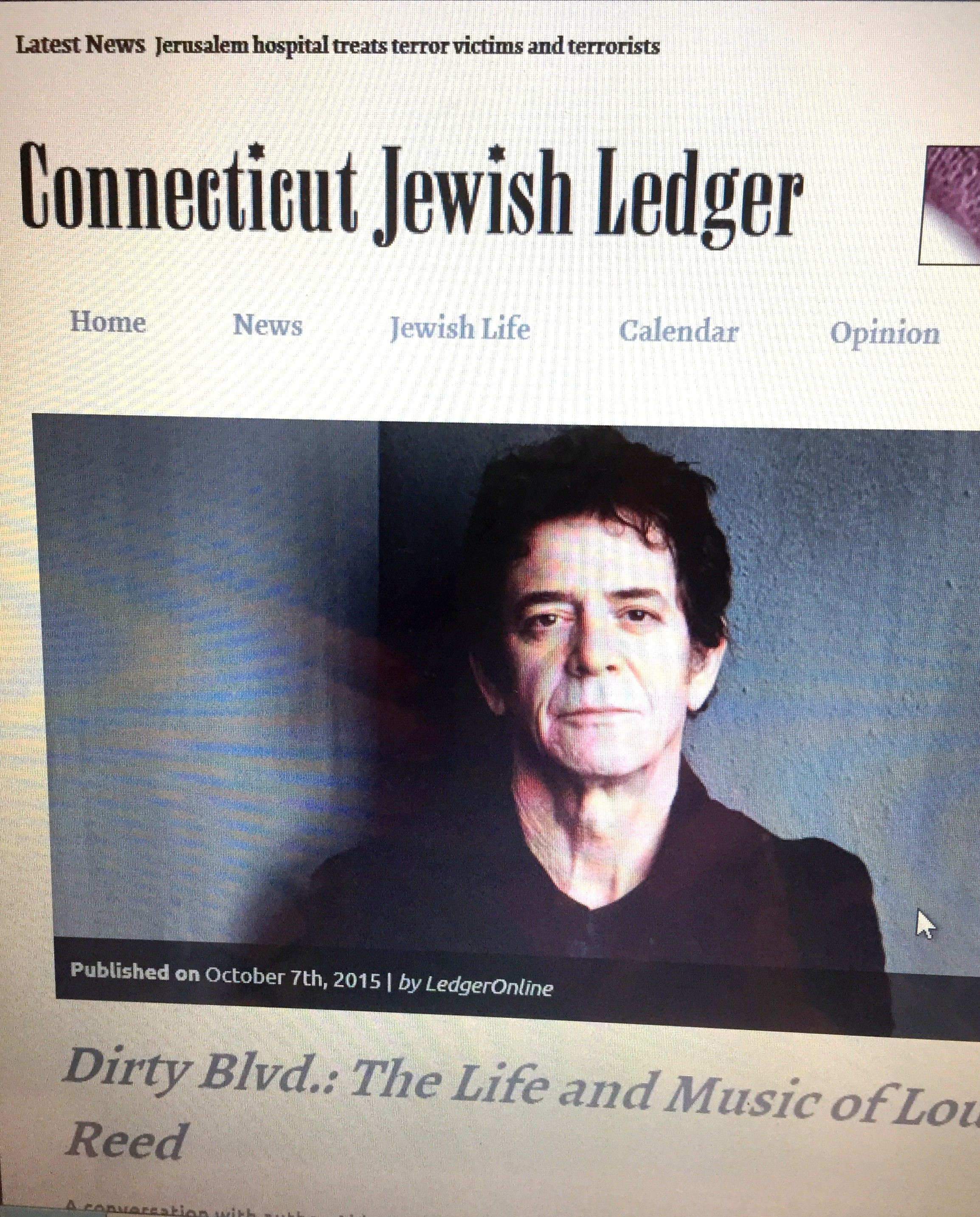 It was only when I accidentally let news of its impending release slip to a local editor that a lengthy interview with Aidan ended up on the
front page of the Connecticut
Jewish Ledger this week. (Oops. My bad, as they say. I swear I’ll never do it again!) I also promise not to breathe a word here about how you can order his new book, Dirty Blvd.: The Life and Music of Lou Reed, on Amazon.com for only $19.85 (or $18.86 for the Kindle version), even though the rather handsome
book jacket says it costs $28.95. Or find it at the nearest Barnes & Noble, of course. 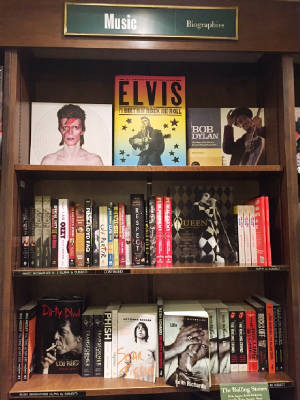 But what can I do? I’m not just a mother. I’m
a nice Jewish one. A very proud one. With an unfortunate embarrassment of naches. I hope you realize that this popular
Yiddish expression means “pride and
delight," particularly the kind of pride and delight derived from one’s children, and that it has absolutely nothing to do with chips, salsa, or melted cheese.  I am particularly proud (and yes, overflowing with naches) about the fact that my son chose to dedicate his book to my husband, my daughter, and me. What a mensch! I’m also proud that
Aidan, a 29-year-old jazz journalist who has written for The Village Voice, JazzTimes magazine, The New York Times and the Daily Forward, somehow managed to whip off this 406-page tome in his "spare time" during the first year of his full-time Ph.D. program in English
and Comparative Literature at Columbia. (How exactly did he do this? “I don’t know,”
he says.)  And I am understandably proud of the positive reviews the book is getting,
including this one from Kirkus Reviews: “The details of Reed’s ascendance, fall,
and comeback as a solo artist are so vital and culturally significant they read like a Hollywood script, and Levy ably
captures it… A valuable study of Reed, further cementing his totemic influence
as the high priest of art rock.”
And so, at the risk of really incurring my son's wrath, or sounding like
one of those nice Jewish mothers, I’m going to treat you to a few choice excerpts from Dirty Blvd. here.  As the book jacket notes, “Lou Reed made it his mission to rub people the wrong way,
whether it was with the noise rock he produced with the Velvet Underground in the late 1960s or his polarizing work with Metallica
that would prove to be his swan song. On a personal level, too, he seemed to take pleasure in insulting everyone who crossed
his path. How did this Jewish boy from Long Island, an adolescent doo-wop singer, rise to the status of Godfather of Punk?
And how did he maintain that status for decades? “Dirty Blvd. not only covers the highlights of Reed’s
career, but also explores lesser-known facets
of his work, such as his first recordings with doo-wop
group the Jades, his key literary influences and the impact of Judaism upon
his work...”  The book --
based largely on extensive personal interviews that Aidan conducted with many of Reed’s childhood friends, musical collaborators, former girlfriends and wives and many others -- focuses primarily on the late
rocker’s acerbic personality and turbulent personal life, including a three-year relationship that he conducted with a transgender
woman named Rachel. Yet I thought for the purposes of this particular space I should
select a few passages that deal specifically with Reed’s
Jewish roots.  One of the many things that apparently first drew Aidan to the material was Reed’s background as a nice
(or not-so-nice) Jewish boy who was born in Brooklyn and raised on Long Island, the son of second-generation
Russian immigrants. (Until his father, Sidney, a successful accountant, legally changed the family name, it was Rabinowitz.)
“Lou Reed began, to paraphrase Hubert Selby Jr., as a scream
looking for a mouth. Lou’s grandparents immigrated from the shtetls of Russia to escape the pogroms long before the
Bolshevik Revolution. Mendel Rabinowitz and Fannie Weinberg each came to the United States with the promise of a better life,
for religious freedom and the hope of the American Dream. The streets of Brooklyn were not paved with gold, but when they
arrived at Ellis Island, they were happy to trade the frigid current of the Volga for the free-flowing commerce of the Hudson. 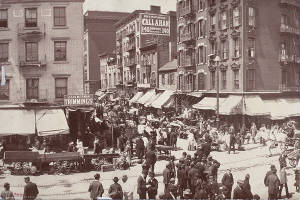
“Before long, Mendel established a presence in the burgeoning immigrant economy
with a successful printing business. In 1912 he married Fannie, and the next year their eldest son, Sidney, was
born. Two more boys followed, and Fannie raised the three Rabinowitz children – Leo, Stanley, and Sidney – in
their apartment in the predominantly Jewish neighborhood of Borough Park. As was the case with nearly all Jewish immigrants,
the Rabinowitz family were Orthodox and kept a kosher kitchen. Not only did this honor the tradition of the old country and
the free expression of their heritage that had once been denied to them, they would never forget where they came from.
“While Leo became a chemist and Stanley a clerk in the family business, Sidney
trained to become an accountant, dashing hopes at a writing career to shore up his mother’s wish for him to join the
middle class as a productive member of society… 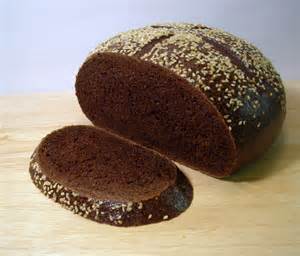
“They were Jews first and foremost, but reaping the full benefits of upward mobility
in a free-enterprise economy that extended beyond the boundaries of the ersatz shtetl they had re-created in Borough Park
meant cutting down on the pumpernickel and assimilating into white-bread American society. A name like Sidney
Rabinowitz – polysyllabic, phlegmatic, and unmistakably Jewish – was not neutral
enough. The name that suited his ambitions sounded much more like Reed. “Not
far away, Lou’s maternal grandparents were living a similar story of immigrant striving in a brick row house in the
Brownsville section of Brooklyn. Rebecca had immigrated from Poland in 1906 and married another Polish Jew, Louis
Futterman, who had arrived three years earlier and was ten years older. Louis worked as a skirt manufacturer in a Jewish-rungarment
factory in Brownsville owned by Hyman Feingold until his death. After the
passing of her husband, Rebecca presided over the household and her children – Leon, an accountant slightly younger
than Sidney; Ralph, who had not even had his bar mitzvah yet; and Toby, a beautiful court stenographer… 
“Six months after her eighteenth birthday, [Toby] was nominated for the annual
Stenographers’ Ball, a beauty pageant for young women whose typing skills were only rivaled by their beauty. In 1939
Jewish girls generally were not included in beauty pageants; black girls were strictly banned from Miss America, and though
the anti-Semitism was never an institutional policy, it wasn’t until 1945 that the first and only Jewish Miss America
was crowned. The Stenographer’s Ball was about as close as they could get. Much to her surprise, Toby won... [making] her
the hottest catch in Brooklyn. “Yet Toby’s strutting days
were short-lived. Soon, Sidney and Toby were engaged. They got married, and when Toby was twenty, they were expecting their
first child. Sidney had his last name legally changed to Reed, and the couple began to imagine a future for themselves that
built on their parents’ sacrifices… 
“On March 2, 1942, the night of a total lunar eclipse, Lewis Allan Reed came screaming
into the world at Beth-El Hospital in Brownsville, only five blocks from where Toby grew up. In keeping with Jewish tradition,
they named him Lewis in honor of his late grandfather. 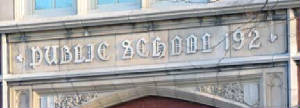 “…
Lou grew into a thin, saturnine child with kinky dark hair. When he was five… Lou’s
parents enrolled him in PS 192, the public elementary school four blocks from their apartment. The school was Lou’s
first taste of the polyglot reality of Brooklyn, a rough introduction to a culture clash where survival of the fittest dictated
the cutthroat playground politics… “Yet there were some distinct
pleasures of growing up along Kings Highway, a positive aspect to his upbringing that Lou would not reveal until 1996 with Set the Twilight Reeling, when he waxed nostalgic on the song “Egg Cream.”  When I was a young man, no bigger than this A chocolate
egg cream was not to be missed Some U Bet’s chocolate syrup, seltzer water mixed with
milk Stir it up into a heady fro, tasted just like silk  “Lou was dyslexic, and despite
his precocious intelligence and streetwise acumen, he struggled to read; even as child, he needed something to take the edge
off, and a chocolate egg cream was his drug of choice… “In
the postwar boom, Lou’s father got hired as the treasurer of Cellu-Craft,
a plastics manufacturer on Long Island, finally securing a position that would allow the family to leave
Brooklyn…  “Lou’s
new life in Freeport, though a jarring adjustment from Brooklyn, proved a fertile incubator for the angst that fueled his
later work; Lou’s violent reaction to the experience of growing up in the suburbs would eventually be his ticket out.
In Freeport, he faced a slew of more insidious slings and arrows – bar mitzvah lessons, soda shop gossip, and Republican
neighbors – but coming in at a fever pitch on 1010 WINS, he also found the transformative
power of rock ‘n’ roll.”  The book goes on to follow
Reed to Congregation B’nai Israel, the Conservative synagogue at which, Aidan writes, “he
was sentenced to Hebrew School three times a week,” as his parents attempted
to combat the healthy disrespect for authority he displayed and “curb his rebellious behavior with bar mitzvah lessons.”
In case you are wondering, Reed’s bar mitzvah indeed took place in 1955 (the year that I was born). As we all know, Reed’s rebellious
behavior was far from ever curbed. Neither was his healthy (or not-so-healthy) disrespect. How else could this nice (or not-so-nice) Jewish boy from Brooklyn and Long Island have evolved into the
King of Punk? But if you want to know more, you simply will have to buy the book yourself.
Here’s a link to do just that on
Amazon.com at the bargain rate of only $19.85. 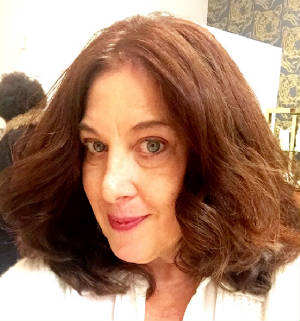 http://www.amazon.com/Dirty-Blvd-Life-Music-Reed/dp/161373106X/ref=sr_1_1?ie=UTF88 But please remember – I may be a nice (and understandably proud) Jewish
mom with an embarrassment of naches, but if my son asks, well, you didn’t hear it from me.
|